Home Blog Education Presentation Skills 101: A Guide to Presentation Success

Presentation Skills 101: A Guide to Presentation Success
Getting the perfect presentation design is just a step toward a successful presentation. For the experienced user, building presentation skills is the answer to elevating the power of your message and showing expertise on any subject. Still, one can ask: is it the same set of skills, or are they dependable on the type of presentation?
In this article, we will introduce the different types of presentations accompanied by the skillset required to master them. The purpose, as always, is to retain the audience’s interest for a long-lasting and convincing message.
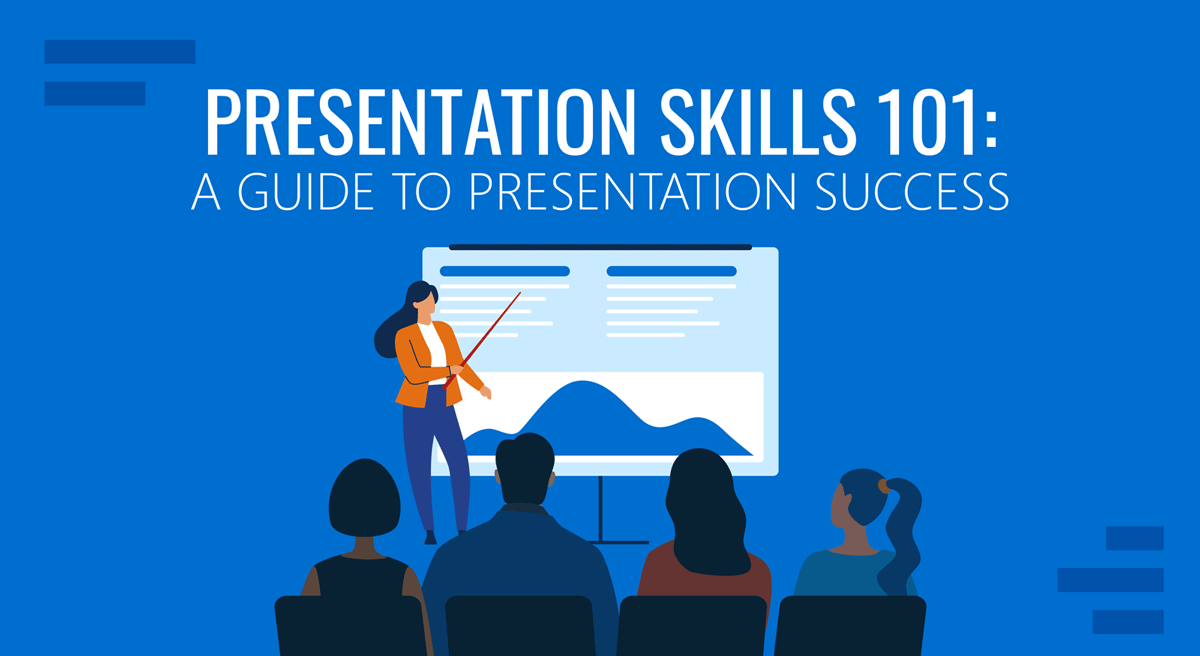
Table of Contents
The Importance of Presentation Skills
Persuasive presentations, instructional presentations, informative presentations, inspirational presentations, basic presentation skills, what are the main difficulties when giving a presentation, recommendations to improve your presentation skills, closing statement.
Effective communication is the answer to reaching business and academic goals. The scenarios in which we can be required to deliver a presentation are as diverse as one can imagine. Still, some core concepts apply to all presentations.
We define presentation skills as a compendium of soft skills that directly affect your presentation performance and contribute to creating a great presentation. These are not qualities acquired by birth but skills you ought to train and master to delve into professional environments.
You may ask: is it really that evident when a presenter is not prepared? Here are some common signs people can experience during presentations:
- Evasive body language: Not making eye contact with the audience, arms closed tightly to the body, hands in pockets all the time.
- Lack of interest in the presenter’s voice: dull tone, not putting an effort to articulate the topics.
- Doubting when asked to answer a question
- Irksome mood
The list can go on about common presenter mistakes , and most certainly, it will affect the performance of any presented data if the lack of interest by the presenter is blatantly obvious. Another element to consider is anxiety, and according to research by the National Institute of Mental Health, 73% of the population in the USA is affected by glossophobia , which is the fear of public speaking, judgment, or negative evaluation by other people.
Therefore, presentation skills training is essential for any business professional who wants to achieve effective communication . It will remove the anxiety from presentation performance and help users effectively deliver their message and connect with the audience.
Archetypes of presentations
Persuasive presentations aim to convince the audience – often in short periods – to acquire a product or service, adhere to a cause, or invest in a company. For business entrepreneurs or politicians, persuasive presentations are their tool for the trade.
Unless you aim to be perceived as an imposter, a proper persuasive presentation has the elements of facts, empathy, and logic, balanced under a well-crafted narrative. The central pillar of these presentations is to identify the single factor that gathered your audience: it could be a market need, a social cause, or a revolutionary concept for today’s society. It has to be something with enough power to gather critiques – both good and bad.
That single factor has to be backed up by facts. Research that builds your hypothesis on how to solve that problem. A deep understanding of the target audience’s needs , concerns, and social position regarding the solution your means can offer. When those elements are in place, building a pitch becomes an easy task.
Graphics can help you introduce information in a compelling format, lowering the need for lengthy presentations. Good presentation skills for persuasive presentations go by the hand of filtering relevant data and creating the visual cues that resonate with what your audience demands.
One powerful example of a persuasive presentation is the technique known as the elevator pitch . You must introduce your idea or product convincingly to the audience in a timeframe between 30 seconds and less than 2 minutes. You have to expose:
- What do you do
- What’s the problem to solve
- Why is your solution different from others
- Why should the audience care about your expertise
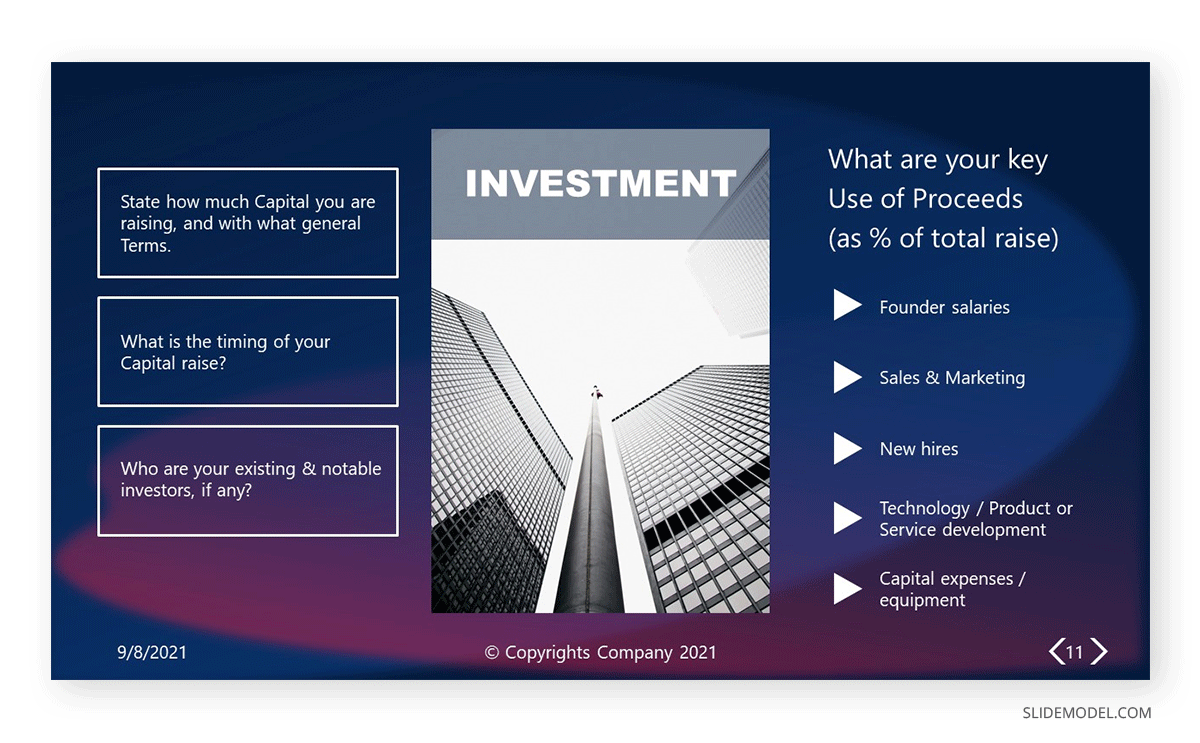
For that very purpose, using engaging graphics with contrasting colors elevates the potential power of your message. It speaks professionalism, care for details, and out-of-the-box thinking. Knowing how to end a presentation is also critical, as your CTAs should be placed with care.
Therefore, let’s resume the requirements of persuasive presentations in terms of good presentation skills:
- Identifying problems and needs
- Elaborating “the hook” (the element that grabs the audience’s attention)
- Knowing how to “tie” your audience (introducing a piece of information related to the hook that causes an emotional impact)
- Broad knowledge of body language and hand gestures to quickly convey your message
- Being prepared to argue a defense of your point of view
- Handling rejection
- Having a proactive attitude to convert opportunities into new projects
- Using humor, surprise, or personal anecdotes as elements to sympathize with the audience
- Having confidence
- Be able to summarize facts and information in visually appealing ways
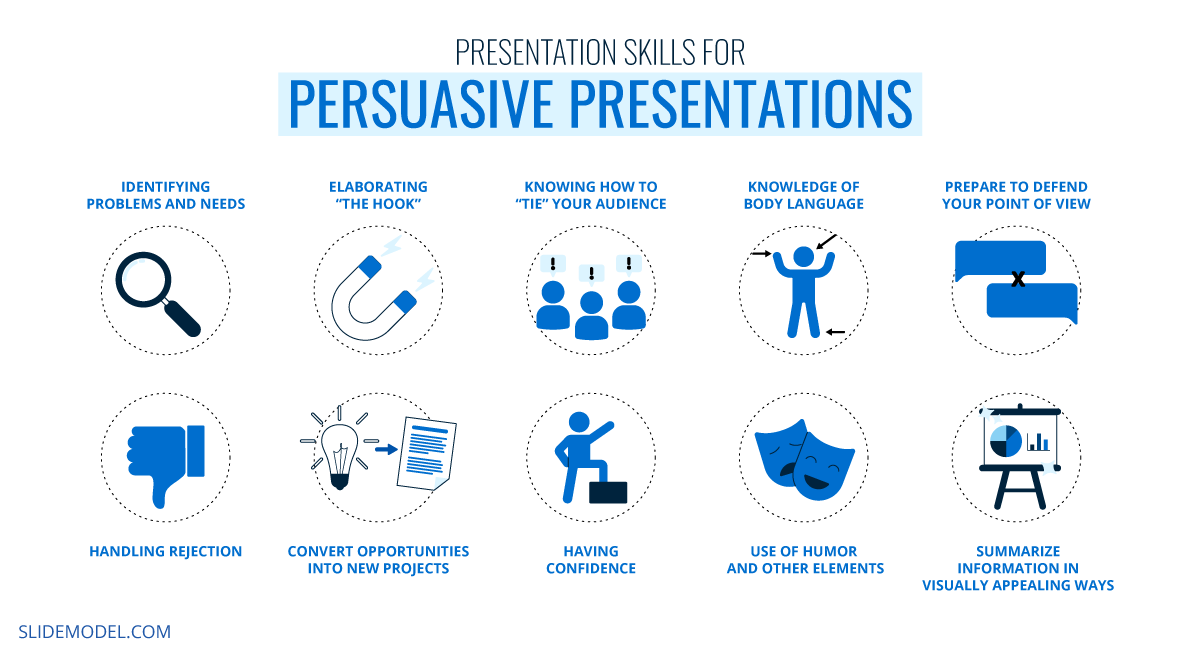
You can learn more about persuasive presentation techniques by clicking here .
In the case of instructional presentations, we ought to differentiate two distinctive types:
- Lecture Presentations : Presentations being held at universities or any other educative institution. Those presentations cover, topic by topic, and the contents of a syllabus and are created by the team of teachers in charge of the course.
- Training Presentations : These presentations take place during in-company training sessions and usually comprise a good amount of content that is resumed into easy-to-take solutions. They are aimed to coach employees over certain topics relevant to their work performance. The 70-20-10 Model is frequently used to address these training situations.
Lecture presentations appeal to the gradual introduction of complex concepts, following a structure set in the course’s syllabus. These presentations often have a similar aesthetic as a group of professors or researchers created to share their knowledge about a topic. Personal experience does tell that course presentations often rely on factual data, adequately documented, and on the theoretical side.
An example of a presentation that lies under this concept is a Syllabus Presentation, used by the teaching team to introduce the subject to new students, evaluation methods, concepts to be learned, and expectations to pass the course.
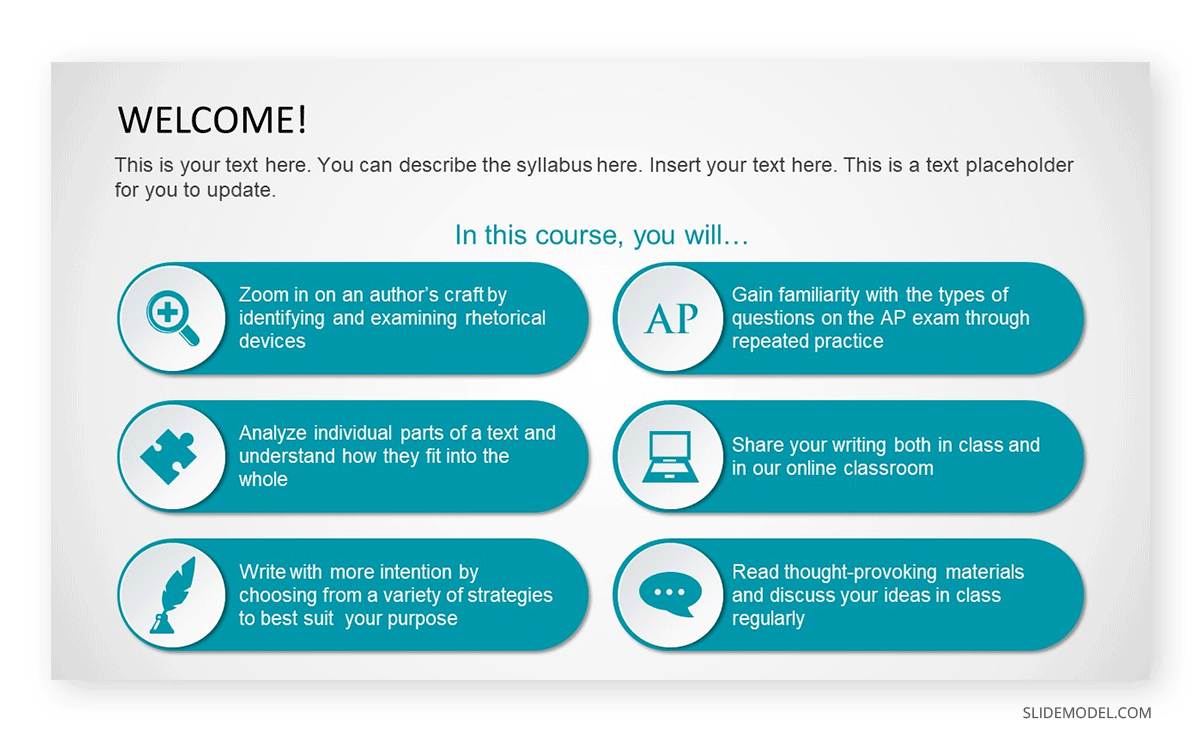
On the other hand, training presentations are slide decks designed to meet an organization’s specific needs in the formal education of their personnel. Commonly known as “continuous education,” plenty of companies invest resources in coaching their employees to achieve higher performance results. These presentations have the trademark of being concise since their idea is to introduce the concepts that shall be applied in practice sessions.
Ideally, the training presentations are introduced with little text and easy-to-recognize visual cues. Since the idea is to summarize as much as possible, these are visually appealing for the audience. They must be dynamic enough to allow the presenter to convey the message.
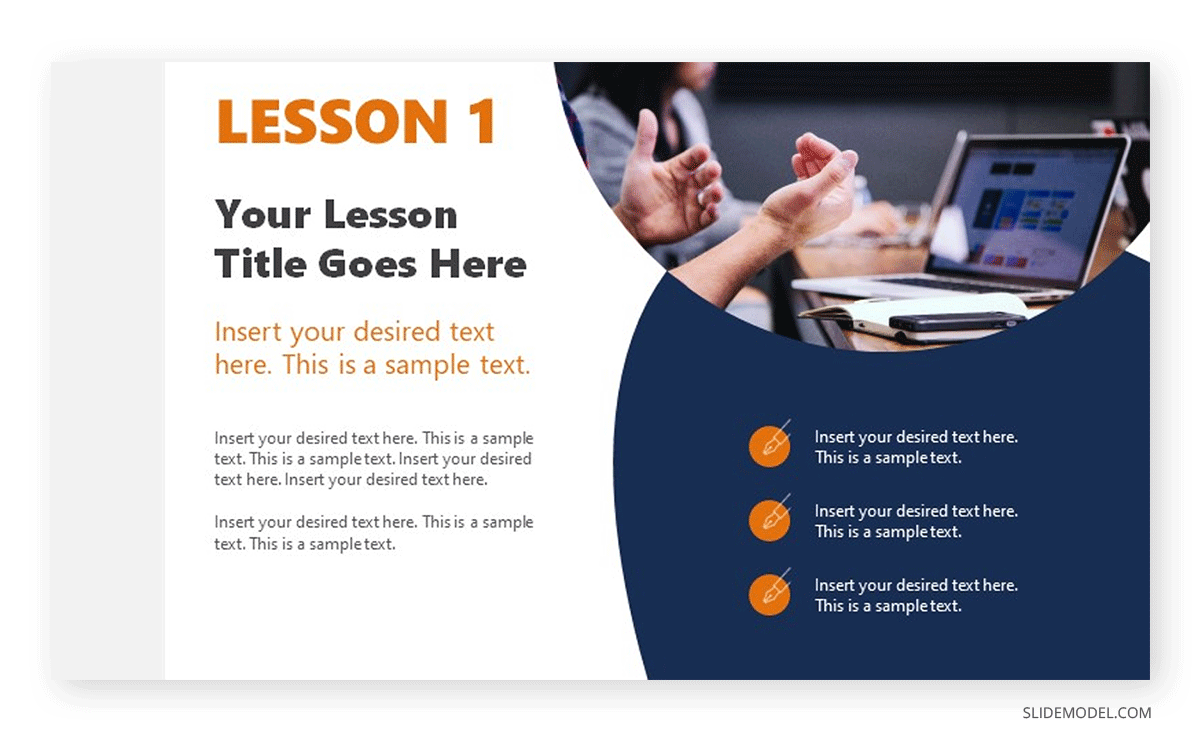
Those key takeaways remind employees when they revisit their learning resources and allow them to ruminate on questions that fellow workers raise.
To sum up this point, building presentation skills for instructional presentations requires:
- Ability to put complex concepts into simpler words
- Patience and a constant learning mindset
- Voice training to deliver lengthy speeches without being too dense
- Ability to summarize points and note the key takeaways
- Empathizing with the audience to understand their challenges in the learning process
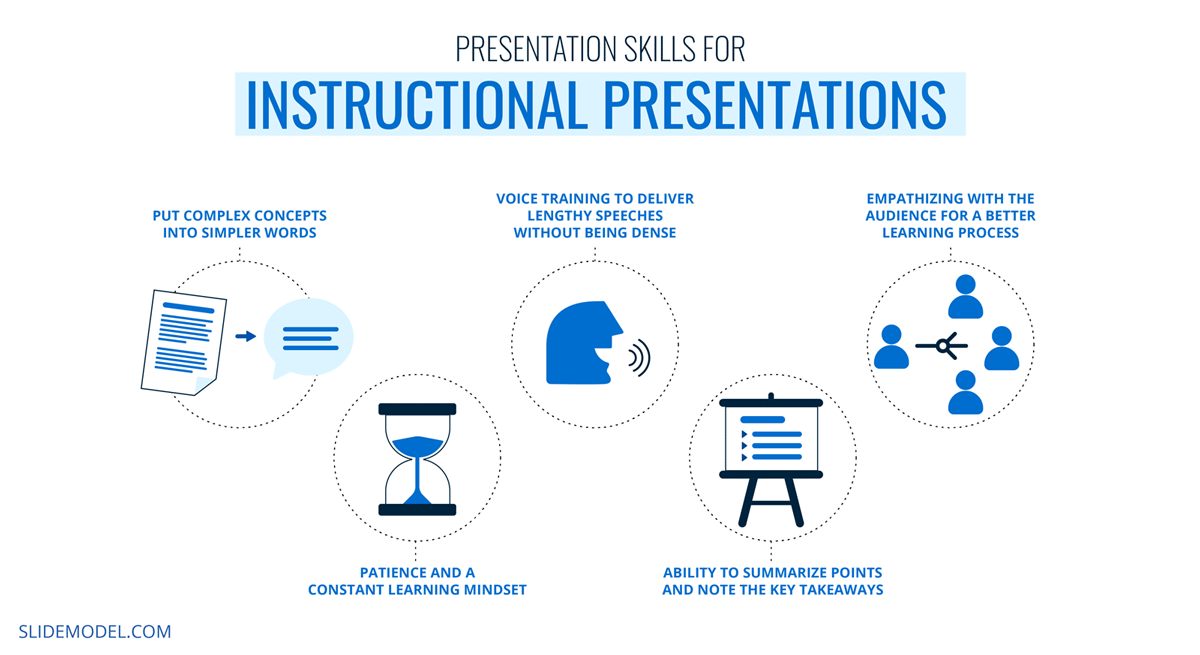
The informative presentations take place in business situations, such as when to present project reports from different departments to the management. Another potential usage of these presentations is in SCRUM or other Agile methodologies, when a sprint is completed, to discuss the advance of the project with the Product Owner.
As they are presentations heavily dependent on data insights, it’s common to see the usage of infographics and charts to express usually dense data in simpler terms and easy to remember.
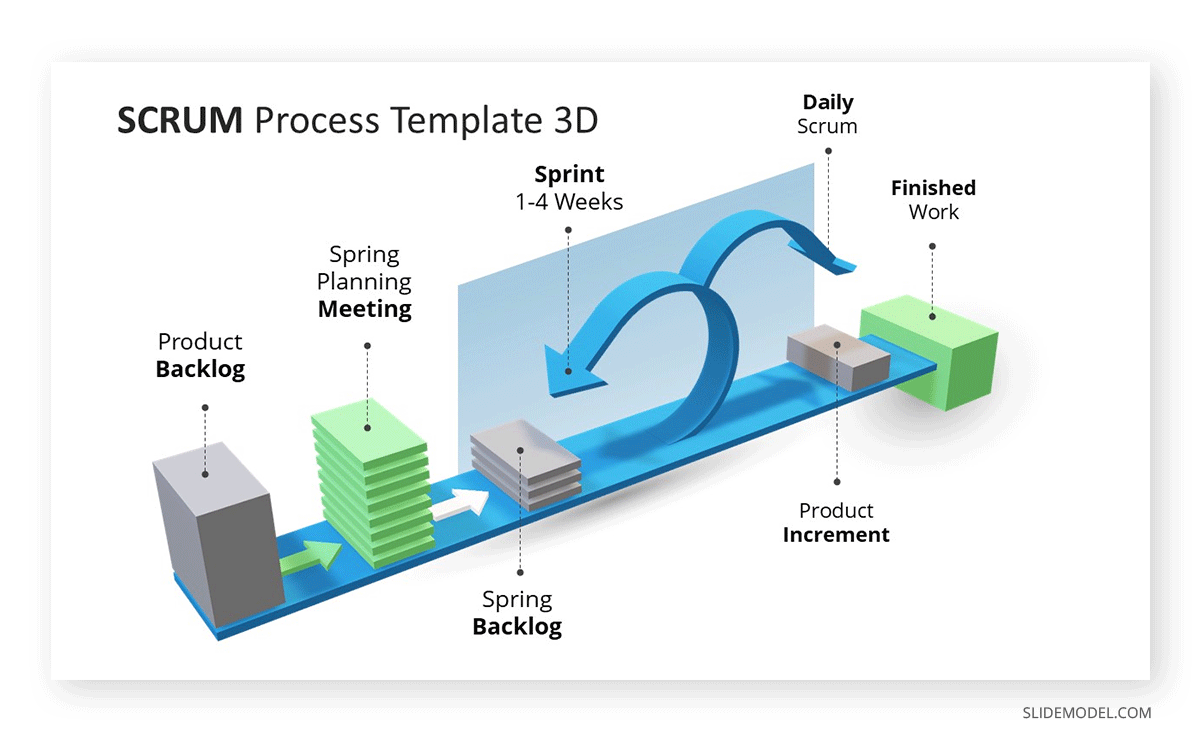
Informative presentations don’t just fall into the business category. Ph.D. Dissertation and Thesis presentations are topics that belong to the informative presentations category as they condense countless research hours into manageable reports for the academic jury.
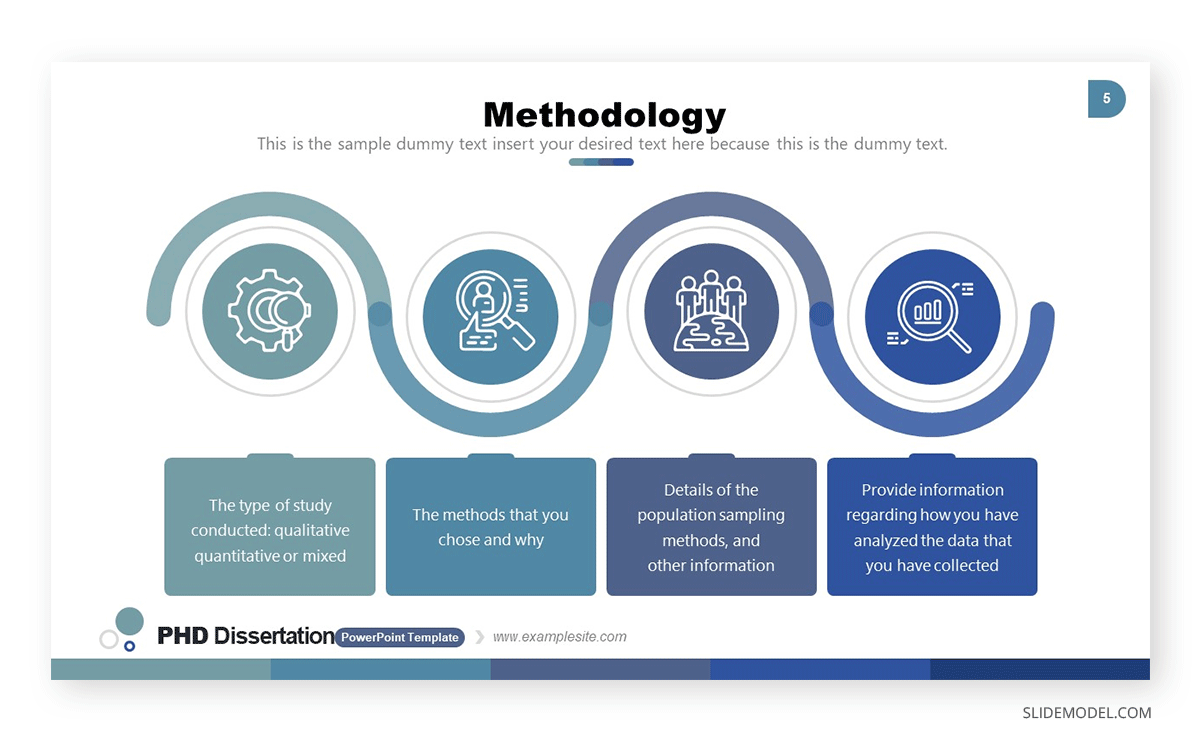
Since these informational presentations can be perceived as lengthy and data-filled, it is important to learn the following professional presentation skills:
- Attention to detail
- Be able to explain complex information in simpler terms
- Creative thinking
- Powerful diction
- Working on pauses and transitions
- Pacing the presentation, so not too much information is divulged per slide
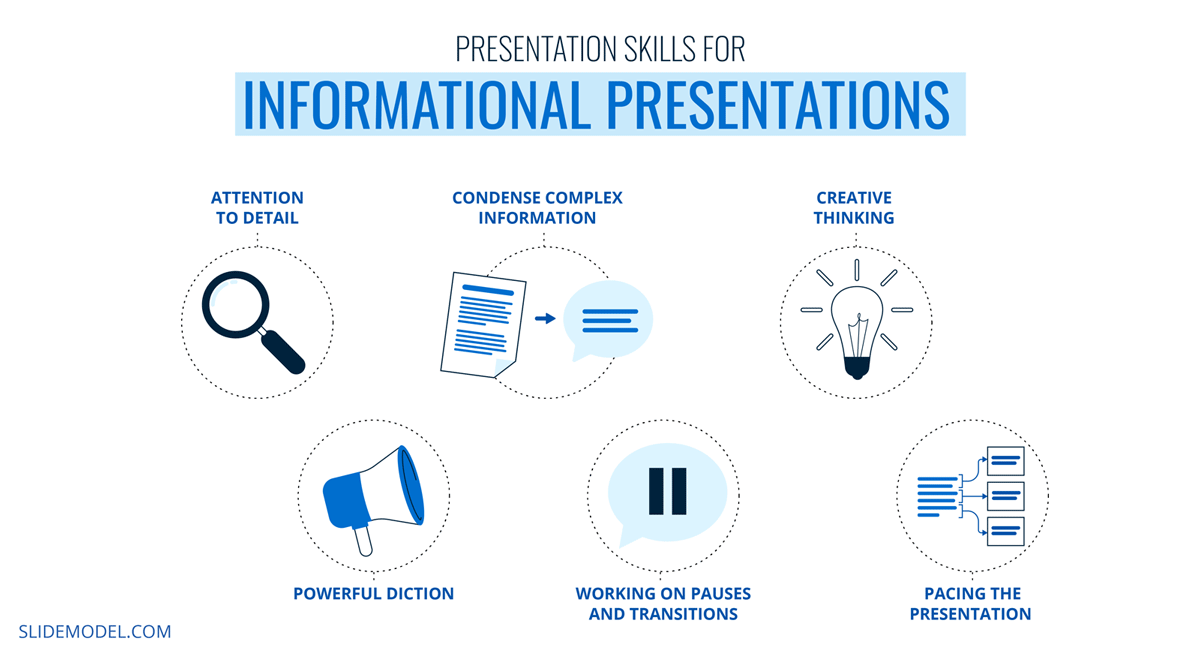
The leading inspirational platform, TEDx, comes to mind when talking about inspirational presentations. This presentation format has the peculiarity of maximizing the engagement with the audience to divulge a message, and due to that, it has specific requirements any presenter must meet.
This presentation format usually involves a speaker on a stage, either sitting or better standing, in which the presenter engages with the audience with a storytelling format about a life experience, a job done that provided a remarkable improvement for society, etc.

Empathizing with the audience is the key ingredient for these inspirational presentations. Still, creativity is what shapes the outcome of your performance as people are constantly looking for different experiences – not the same recipe rephrased with personal touches. The human factor is what matters here, way above data and research. What has your experience to offer to others? How can it motivate another human being to pursue a similar path or discover their true calling?
To achieve success in terms of communication skills presentation, these inspirational presentations have the following requirements:
- Focus on the audience (engage, consider their interests, and make them a part of your story)
- Putting ego aside
- Creative communication skills
- Storytelling skills
- Body language knowledge to apply the correct gestures to accompany your story
- Voice training
- Using powerful words
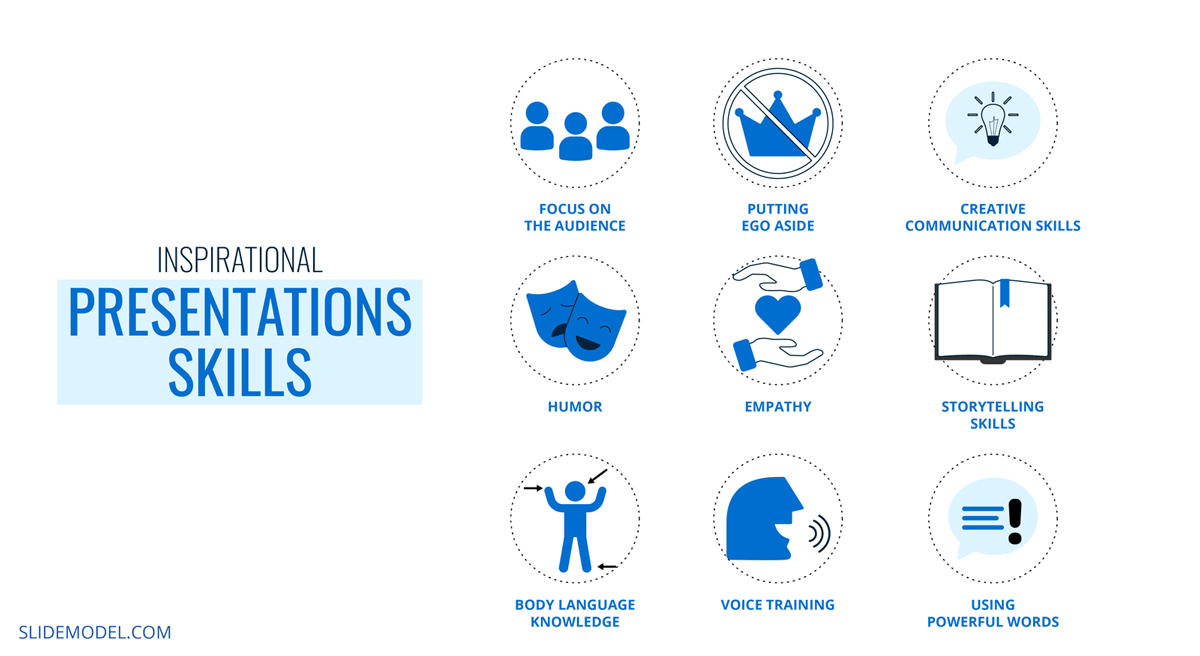
After discussing the different kinds of presentations we can come across at any stage of our lives, a group of presentation skills is standard in any type of presentation. See below what makes a good presentation and which skills you must count on to succeed as a presenter.
Punctuality
Punctuality is a crucial aspect of giving an effective presentation. Nothing says more about respect for your audience and the organization you represent than delivering the presentation on time . Arriving last minute puts pressure on the tech team behind audiovisuals, as they don’t have enough preparation to test microphones, stage lights, and projector settings, which can lead to a less powerful presentation Even when discussing presentations hosted in small rooms for a reduced audience, testing the equipment becomes essential for an effective presentation.
A solution for this is to arrive at least 30 minutes early. Ideally, one hour is a sweet spot since the AV crew has time to check the gear and requirements for your presentation. Another benefit of this, for example, in inspirational presentations, is measuring the previous presenter’s impact on the audience. This gives insights about how to resonate with the public, and their interest, and how to accommodate your presentation for maximum impact.
Body Language
Our bodies can make emotions transparent for others, even when we are unaware of such a fact. Proper training for body language skills reduces performance anxiety, giving the audience a sense of expertise about the presented topic.
Give your presentation and the audience the respect they deserve by watching over these potential mistakes:
- Turning your back to the audience for extended periods : It’s okay to do so when introducing an important piece of information or explaining a graph, but it is considered rude to give your back to the audience constantly.
- Fidgeting : We are all nervous in the presence of strangers, even more, if we are the center of attention for that moment. Instead of playing with your hair or making weird hand gestures, take a deep breath to center yourself before the presentation and remember that everything you could do to prepare is already done. Trust your instincts and give your best.
- Intense eye contact : Have you watched a video where the presenter stared at the camera the entire time? That’s the feeling you transmit to spectators through intense eye contact. It’s a practice often used by politicians to persuade.
- Swearing : This is a no-brainer. Even when you see influencers swearing on camera or in podcasts or live presentations, it is considered an informal and lousy practice for business and academic situations. If you have a habit to break when it comes to this point, find the humor in these situations and replace your swear words with funny alternatives (if the presentation allows for it).
Voice Tone plays a crucial role in delivering effective presentations and knowing how to give a good presentation. Your voice is a powerful tool for exposing your ideas and feelings . Your voice can articulate the message you are telling, briefing the audience if you feel excited about what you are sharing or, in contrast, if you feel the presentation is a burden you ought to complete.
Remember, passion is a primary ingredient in convincing people. Therefore, transmitting such passion with a vibrant voice may help gather potential business partners’ interest.
But what if you feel sick prior to the presentation? If, by chance, your throat is sore minutes before setting foot on the stage, try this: when introducing yourself, mention that you are feeling a bit under the weather. This resonates with the audience to pay more attention to your efforts. In case you don’t feel comfortable about that, ask the organizers for a cup of tea, as it will settle your throat and relax your nerves.
Tech Skills
Believe it or not, people still feel challenged by technology these days. Maybe that’s the reason why presentation giants like Tony Robbins opt not to use PowerPoint presentations . The reality is that there are plenty of elements involved in a presentation that can go wrong from the tech side:
- A PDF not opening
- Saving your presentation in a too-recent PowerPoint version
- A computer not booting up
- Mac laptops and their never-ending compatibility nightmare
- Not knowing how to change between slides
- Not knowing how to use a laser pointer
- Internet not working
- Audio not working
We can come up with a pretty long list of potential tech pitfalls, and yet more than half of them fall in presenters not being knowledgeable about technology.
If computers aren’t your thing, let the organization know about this beforehand. There is always a crew member available to help presenters switch between slides or configure the presentation for streaming. This takes the pressure off your shoulders, allowing you to concentrate on the content to present. Remember, even Bill Gates can get a BSOD during a presentation .
Presentations, while valuable for conveying information and ideas, can be daunting for many individuals. Here are some common difficulties people encounter when giving presentations:
Public Speaking Anxiety
Glossophobia, the fear of public speaking, affects a significant portion of the population. This anxiety can lead to nervousness, trembling, and forgetfulness during a presentation.
Lack of Confidence
Many presenters struggle with self-doubt, fearing that they may not be knowledgeable or skilled enough to engage their audience effectively.
Content Organization
Organizing information in a coherent and engaging manner can be challenging. Presenters often grapple with how to structure their content to make it easily digestible for the audience. Artificial Intelligence can help us significantly reduce the content arrangement time when you work with tools like our AI Presentation Maker (made for presenters by experts in presentation design).
Audience Engagement
Keeping the audience’s attention and interest throughout the presentation can be difficult. Distractions, disengaged attendees, or lack of interaction can pose challenges.
Technical Issues
Technology glitches, such as malfunctioning equipment, incompatible file formats, or poor internet connectivity, can disrupt presentations and increase stress.
Time Management
Striking the right balance between providing enough information and staying within time limits is a common challenge. Going over or under the allotted time can affect the effectiveness of the presentation.
Handling Questions and Challenges
Responding to unexpected questions, criticism, or challenges from the audience can be difficult, especially when presenters are unprepared or lack confidence in their subject matter.
Visual Aids and Technology
Creating and effectively using visual aids like slides or multimedia can be a struggle for some presenters. Technical competence is essential in this aspect.
Language and Articulation
Poor language skills or unclear articulation can hinder effective communication. Presenters may worry about stumbling over words or failing to convey their message clearly.
Maintaining appropriate and confident body language can be challenging. Avoiding nervous habits, maintaining eye contact, and using gestures effectively requires practice.
Overcoming Impersonal Delivery
In virtual presentations, maintaining a personal connection with the audience can be difficult. The absence of face-to-face interaction can make it challenging to engage and read the audience.
Cultural and Diversity Awareness
Presenting to diverse audiences requires sensitivity to cultural differences and varying levels of familiarity with the topic.
In this section, we gathered some tips on how to improve presentation skills that can certainly make an impact if applied to your presentation skills. We believe these skills can be cultivated to transform into habits for your work routine.
Tip #1: Build a narrative
One memorable way to guarantee presentation success is by writing a story of all the points you desire to cover. This statement is based on the logic behind storytelling and its power to connect with people .
Don’t waste time memorizing slides or reading your presentation to the audience. It feels unnatural, and any question that diverts from the topic in discussion certainly puts you in jeopardy or, worse, exposes you as a fraud in the eyes of the audience. And before you ask, it is really evident when a presenter has a memorized speech.
Build and rehearse the presentation as if telling a story to a group of interested people. Lower the language barrier by avoiding complex terms that maybe even you aren’t fully aware of their meaning. Consider the ramifications of that story, what it could lead to, and which are the opportunities to explore. Then, visualize yourself giving the presentation in a natural way.
Applying this technique makes the presentation feel like second nature to you. It broadens the spectrum in which you can show expertise over a topic or even build the basis for new interesting points of view about the project.
Tip #2: Don’t talk for more than 3 minutes per slide
It is a common practice of presenters to bombard the audience with facts and information whilst retaining the same slide on the screen. Why can this happen? It could be because the presenter condensed the talk into very few slides and preferred to talk. The reality is that your spectators won’t retain the information you are giving unless you give visual cues to help that process.
Opt to prepare more slides and pace your speech to match the topics shown on each slide. Don’t spend more than 3 minutes per slide unless you have to introduce a complex piece of data. Use visual cues to direct the spectators about what you talk about, and summarize the principal concepts discussed at the end of each section.
Tip #3: Practice meditation daily
Anxiety is the number one enemy of professional presenters. It slowly builds without you being aware of your doubts and can hinder your performance in multiple ways: making you feel paralyzed, fidgeting, making you forget language skills or concepts, affecting your health, etc.
Meditation is an ancient practice taken from Buddhist teachings that train your mind to be here in the present. We often see the concepts of meditation and mindfulness as synonyms, whereas you should be aware that meditation is a practice that sets the blocks to reach a state of mindfulness. For presenters, being in the here and now is essential to retain focus, but meditation techniques also teach us to control our breathing and be in touch with our body signals when stress builds up.
The customary practice of meditation has an impact on imagination and creativity but also helps to build patience – a skill much needed for connecting with your audience in instructional presentations.
Having the proper set of presentation skills can be quite subjective. It goes beyond presentation tips and deepens into how flexible we can be in our ability to communicate ideas.
Different presentations and different audiences shape the outcome of our efforts. Therefore, having a basic understanding of how to connect, raise awareness, and empathize with people can be key ingredients for your career as a presenter. A word of advice: success doesn’t happen overnight. It takes dedication and patience to build communication skills . Don’t condition your work to believe you will be ready “someday”; it’s best to practice and experience failure as part of the learning process.
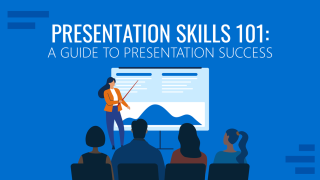
Like this article? Please share
Business Presentations, Presentation Approaches, Presentation Skills Filed under Education
Related Articles

Filed under Design • March 27th, 2024
How to Make a Presentation Graph
Detailed step-by-step instructions to master the art of how to make a presentation graph in PowerPoint and Google Slides. Check it out!
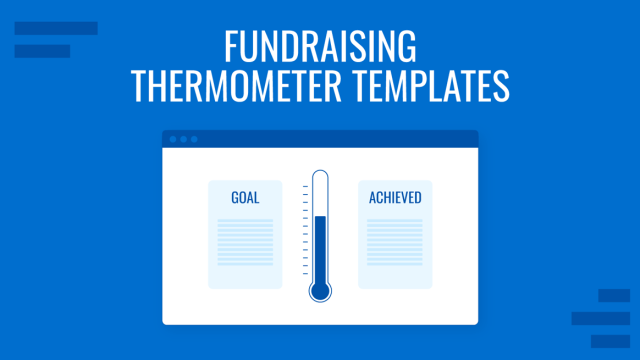
Filed under Presentation Ideas • February 29th, 2024
How to Make a Fundraising Presentation (with Thermometer Templates & Slides)
Meet a new framework to design fundraising presentations by harnessing the power of fundraising thermometer templates. Detailed guide with examples.
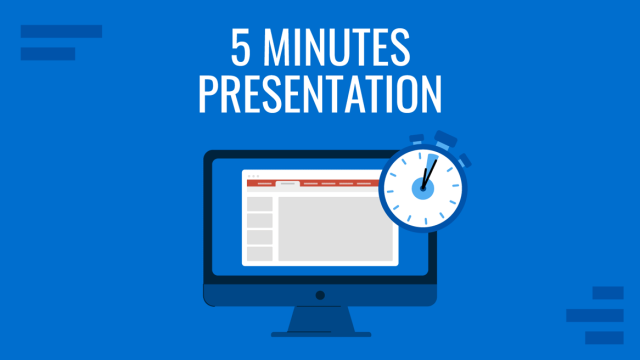
Filed under Presentation Ideas • February 15th, 2024
How to Create a 5 Minutes Presentation
Master the art of short-format speeches like the 5 minutes presentation with this article. Insights on content structure, audience engagement and more.
Leave a Reply

How it works
Transform your enterprise with the scalable mindsets, skills, & behavior change that drive performance.
Explore how BetterUp connects to your core business systems.
We pair AI with the latest in human-centered coaching to drive powerful, lasting learning and behavior change.
Build leaders that accelerate team performance and engagement.
Unlock performance potential at scale with AI-powered curated growth journeys.
Build resilience, well-being and agility to drive performance across your entire enterprise.
Transform your business, starting with your sales leaders.
Unlock business impact from the top with executive coaching.
Foster a culture of inclusion and belonging.
Accelerate the performance and potential of your agencies and employees.
See how innovative organizations use BetterUp to build a thriving workforce.
Discover how BetterUp measurably impacts key business outcomes for organizations like yours.
A demo is the first step to transforming your business. Meet with us to develop a plan for attaining your goals.

- What is coaching?
Learn how 1:1 coaching works, who its for, and if it's right for you.
Accelerate your personal and professional growth with the expert guidance of a BetterUp Coach.
Types of Coaching
Navigate career transitions, accelerate your professional growth, and achieve your career goals with expert coaching.
Enhance your communication skills for better personal and professional relationships, with tailored coaching that focuses on your needs.
Find balance, resilience, and well-being in all areas of your life with holistic coaching designed to empower you.
Discover your perfect match : Take our 5-minute assessment and let us pair you with one of our top Coaches tailored just for you.

Best practices, research, and tools to fuel individual and business growth.
View on-demand BetterUp events and learn about upcoming live discussions.
The latest insights and ideas for building a high-performing workplace.
- BetterUp Briefing
The online magazine that helps you understand tomorrow's workforce trends, today.
Innovative research featured in peer-reviewed journals, press, and more.
Founded in 2022 to deepen the understanding of the intersection of well-being, purpose, and performance
We're on a mission to help everyone live with clarity, purpose, and passion.
Join us and create impactful change.
Read the buzz about BetterUp.
Meet the leadership that's passionate about empowering your workforce.

For Business
For Individuals
6 presentation skills and how to improve them

Elevate your communication skills
Unlock the power of clear and persuasive communication. Our coaches can guide you to build strong relationships and succeed in both personal and professional life.
Jump to section
What are presentation skills?
The importance of presentation skills, 6 presentation skills examples, how to improve presentation skills.
Tips for dealing with presentation anxiety
Learn how to captivate an audience with ease
Capturing an audience’s attention takes practice.
Over time, great presenters learn how to organize their speeches and captivate an audience from start to finish. They spark curiosity, know how to read a room , and understand what their audience needs to walk away feeling like they learned something valuable.
Regardless of your profession, you most likely use presentation skills on a monthly or even weekly basis. Maybe you lead brainstorming sessions or host client calls.
Developing effective presentation skills makes it easier to contribute ideas with confidence and show others you’re someone to trust. Although speaking in front of a crowd sometimes brings nerves and anxiety , it also sparks new opportunities.
Presentation skills are the qualities and abilities you need to communicate ideas effectively and deliver a compelling speech. They influence how you structure a presentation and how an audience receives it. Understanding body language , creating impactful visual aids, and projecting your voice all fall under this umbrella.
A great presentation depends on more than what you say. It’s about how you say it. Storytelling , stage presence, and voice projection all shape how well you express your ideas and connect with the audience. These skills do take practice, but they’re worth developing — especially if public speaking makes you nervous.
Engaging a crowd isn’t easy. You may feel anxious to step in front of an audience and have all eyes and ears on you.
But feeling that anxiety doesn’t mean your ideas aren’t worth sharing. Whether you’re giving an inspiring speech or delivering a monthly recap at work, your audience is there to listen to you. Harness that nervous energy and turn it into progress.
Strong presentation skills make it easier to convey your thoughts to audiences of all sizes. They can help you tell a compelling story, convince people of a pitch , or teach a group something entirely new to them. And when it comes to the workplace, the strength of your presentation skills could play a part in getting a promotion or contributing to a new initiative.
To fully understand the impact these skills have on creating a successful presentation, it’s helpful to look at each one individually. Here are six valuable skills you can develop:
1. Active listening
Active listening is an excellent communication skill for any professional to hone. When you have strong active listening skills, you can listen to others effectively and observe their nonverbal cues . This helps you assess whether or not your audience members are engaged in and understand what you’re sharing.
Great public speakers use active listening to assess the audience’s reactions and adjust their speech if they find it lacks impact. Signs like slouching, negative facial expressions, and roaming eye contact are all signs to watch out for when giving a presentation.
2. Body language
If you’re researching presentation skills, chances are you’ve already watched a few notable speeches like TED Talks or industry seminars. And one thing you probably noticed is that speakers can capture attention with their body language.
A mixture of eye contact, hand gestures , and purposeful pacing makes a presentation more interesting and engaging. If you stand in one spot and don’t move your body, the audience might zone out.

3. Stage presence
A great stage presence looks different for everyone. A comedian might aim for more movement and excitement, and a conference speaker might focus their energy on the content of their speech. Although neither is better than the other, both understand their strengths and their audience’s needs.
Developing a stage presence involves finding your own unique communication style . Lean into your strengths, whether that’s adding an injection of humor or asking questions to make it interactive . To give a great presentation, you might even incorporate relevant props or presentation slides.
4. Storytelling
According to Forbes, audiences typically pay attention for about 10 minutes before tuning out . But you can lengthen their attention span by offering a presentation that interests them for longer. Include a narrative they’ll want to listen to, and tell a story as you go along.
Shaping your content to follow a clear narrative can spark your audience’s curiosity and entice them to pay careful attention. You can use anecdotes from your personal or professional life that take your audience along through relevant moments. If you’re pitching a product, you can start with a problem and lead your audience through the stages of how your product provides a solution.
5. Voice projection
Although this skill may be obvious, you need your audience to hear what you’re saying. This can be challenging if you’re naturally soft-spoken and struggle to project your voice.
Remember to straighten your posture and take deep breaths before speaking, which will help you speak louder and fill the room. If you’re talking into a microphone or participating in a virtual meeting, you can use your regular conversational voice, but you still want to sound confident and self-assured with a strong tone.
If you’re unsure whether everyone can hear you, you can always ask the audience at the beginning of your speech and wait for confirmation. That way, they won’t have to potentially interrupt you later.
Ensuring everyone can hear you also includes your speed and annunciation. It’s easy to speak quickly when nervous, but try to slow down and pronounce every word. Mumbling can make your presentation difficult to understand and pay attention to.

6. Verbal communication
Although verbal communication involves your projection and tone, it also covers the language and pacing you use to get your point across. This includes where you choose to place pauses in your speech or the tone you use to emphasize important ideas.
If you’re giving a presentation on collaboration in the workplace , you might start your speech by saying, “There’s something every workplace needs to succeed: teamwork.” By placing emphasis on the word “ teamwork ,” you give your audience a hint on what ideas will follow.
To further connect with your audience through diction, pay careful attention to who you’re speaking to. The way you talk to your colleagues might be different from how you speak to a group of superiors, even if you’re discussing the same subject. You might use more humor and a conversational tone for the former and more serious, formal diction for the latter.
Everyone has strengths and weaknesses when it comes to presenting. Maybe you’re confident in your use of body language, but your voice projection needs work. Maybe you’re a great storyteller in small group settings, but need to work on your stage presence in front of larger crowds.
The first step to improving presentation skills is pinpointing your gaps and determining which qualities to build upon first. Here are four tips for enhancing your presentation skills:
1. Build self-confidence
Confident people know how to speak with authority and share their ideas. Although feeling good about your presentation skills is easier said than done, building confidence is key to helping your audience believe in what you’re saying. Try practicing positive self-talk and continuously researching your topic's ins and outs.
If you don’t feel confident on the inside, fake it until you make it. Stand up straight, project your voice, and try your best to appear engaged and excited. Chances are, the audience doesn’t know you’re unsure of your skills — and they don’t need to.
Another tip is to lean into your slideshow, if you’re using one. Create something colorful and interesting so the audience’s eyes fall there instead of on you. And when you feel proud of your slideshow, you’ll be more eager to share it with others, bringing more energy to your presentation.
2. Watch other presentations
Developing the soft skills necessary for a good presentation can be challenging without seeing them in action. Watch as many as possible to become more familiar with public speaking skills and what makes a great presentation. You could attend events with keynote speakers or view past speeches on similar topics online.
Take a close look at how those presenters use verbal communication and body language to engage their audiences. Grab a notebook and jot down what you enjoyed and your main takeaways. Try to recall the techniques they used to emphasize their main points, whether they used pauses effectively, had interesting visual aids, or told a fascinating story.

3. Get in front of a crowd
You don’t need a large auditorium to practice public speaking. There are dozens of other ways to feel confident and develop good presentation skills.
If you’re a natural comedian, consider joining a small stand-up comedy club. If you’re an avid writer, participate in a public poetry reading. Even music and acting can help you feel more comfortable in front of a crowd.
If you’d rather keep it professional, you can still work on your presentation skills in the office. Challenge yourself to participate at least once in every team meeting, or plan and present a project to become more comfortable vocalizing your ideas. You could also speak to your manager about opportunities that flex your public speaking abilities.
4. Overcome fear
Many people experience feelings of fear before presenting in front of an audience, whether those feelings appear as a few butterflies or more severe anxiety. Try grounding yourself to shift your focus to the present moment. If you’re stuck dwelling on previous experiences that didn’t go well, use those mistakes as learning experiences and focus on what you can improve to do better in the future.
Tips for dealing with presentation anxiety
It’s normal to feel nervous when sharing your ideas. In fact, according to a report from the Journal of Graduate Medical Education, public speaking anxiety is prevalent in 15–30% of the general population .
Even though having a fear of public speaking is common, it doesn’t make it easier. You might feel overwhelmed, become stiff, and forget what you were going to say. But although the moment might scare you, there are ways to overcome the fear and put mind over matter.
Use these tactics to reduce your stress when you have to make a presentation:
1. Practice breathing techniques
If you experience anxiety often, you’re probably familiar with breathing techniques for stress relief . Incorporating these exercises into your daily routine can help you stop worrying and regulate anxious feelings.
Before a big presentation, take a moment alone to practice breathing techniques, ground yourself, and reduce tension. It’s also a good idea to take breaths throughout the presentation to speak slower and calm yourself down .
2. Get organized
The more organized you are, the more prepared you’ll feel. Carefully outline all of the critical information you want to use in your presentation, including your main talking points and visual aids, so you don’t forget anything. Use bullet points and visuals on each slide to remind you of what you want to talk about, and create handheld notes to help you stay on track.
3. Embrace moments of silence
It’s okay to lose your train of thought. It happens to even the most experienced public speakers once in a while. If your mind goes blank, don’t panic. Take a moment to breathe, gather your thoughts, and refer to your notes to see where you left off. You can drink some water or make a quick joke to ease the silence or regain your footing. And it’s okay to say, “Give me a moment while I find my notes.” Chances are, people understand the position you’re in.

4. Practice makes progress
Before presenting, rehearse in front of friends and family members you trust. This gives you the chance to work out any weak spots in your speech and become comfortable communicating out loud. If you want to go the extra mile, ask your makeshift audience to ask a surprise question. This tests your on-the-spot thinking and will prove that you can keep cool when things come up.
Whether you’re new to public speaking or are a seasoned presenter, you’re bound to make a few slip-ups. It happens to everyone. The most important thing is that you try your best, brush things off, and work on improving your skills to do better in your next presentation.
Although your job may require a different level of public speaking than your favorite TED Talk , developing presentation skills is handy in any profession. You can use presentation skills in a wide range of tasks in the workplace, whether you’re sharing your ideas with colleagues, expressing concerns to higher-ups, or pitching strategies to potential clients.
Remember to use active listening to read the room and engage your audience with an interesting narrative. Don’t forget to step outside your comfort zone once in a while and put your skills to practice in front of a crowd. After facing your fears, you’ll feel confident enough to put presentation skills on your resume.
If you’re trying to build your skills and become a better employee overall, try a communications coach with BetterUp.
Elizabeth Perry, ACC
Elizabeth Perry is a Coach Community Manager at BetterUp. She uses strategic engagement strategies to cultivate a learning community across a global network of Coaches through in-person and virtual experiences, technology-enabled platforms, and strategic coaching industry partnerships. With over 3 years of coaching experience and a certification in transformative leadership and life coaching from Sofia University, Elizabeth leverages transpersonal psychology expertise to help coaches and clients gain awareness of their behavioral and thought patterns, discover their purpose and passions, and elevate their potential. She is a lifelong student of psychology, personal growth, and human potential as well as an ICF-certified ACC transpersonal life and leadership Coach.
The importance of good speech: 5 tips to be more articulate
The 11 tips that will improve your public speaking skills, learn types of gestures and their meanings to improve your communication, why it's good to have a bff at work and how to find one, what’s my earning potential determining the right salary, how to write a speech that your audience remembers, your work performance will sky-rocket with these 13 tips, 6 career changes for teachers that truly pay off, how to give a good presentation that captivates any audience, similar articles, 8 tip to improve your public speaking skills, 30 presentation feedback examples, your ultimate guide on how to be a good storyteller, 8 clever hooks for presentations (with tips), communication coach: what they are and how to find one, how to make a presentation interactive and exciting, stay connected with betterup, get our newsletter, event invites, plus product insights and research..
3100 E 5th Street, Suite 350 Austin, TX 78702
- Platform Overview
- Integrations
- Powered by AI
- BetterUp Lead
- BetterUp Manage™
- BetterUp Care™
- Sales Performance
- Diversity & Inclusion
- Case Studies
- Why BetterUp?
- About Coaching
- Find your Coach
- Career Coaching
- Communication Coaching
- Life Coaching
- News and Press
- Leadership Team
- Become a BetterUp Coach
- BetterUp Labs
- Center for Purpose & Performance
- Leadership Training
- Business Coaching
- Contact Support
- Contact Sales
- Privacy Policy
- Acceptable Use Policy
- Trust & Security
- Cookie Preferences
Ideas and insights from Harvard Business Publishing Corporate Learning

Powerful and Effective Presentation Skills: More in Demand Now Than Ever

When we talk with our L&D colleagues from around the globe, we often hear that presentation skills training is one of the top opportunities they’re looking to provide their learners. And this holds true whether their learners are individual contributors, people managers, or senior leaders. This is not surprising.
Effective communications skills are a powerful career activator, and most of us are called upon to communicate in some type of formal presentation mode at some point along the way.
For instance, you might be asked to brief management on market research results, walk your team through a new process, lay out the new budget, or explain a new product to a client or prospect. Or you may want to build support for a new idea, bring a new employee into the fold, or even just present your achievements to your manager during your performance review.
And now, with so many employees working from home or in hybrid mode, and business travel in decline, there’s a growing need to find new ways to make effective presentations when the audience may be fully virtual or a combination of in person and remote attendees.
Whether you’re making a standup presentation to a large live audience, or a sit-down one-on-one, whether you’re delivering your presentation face to face or virtually, solid presentation skills matter.
Even the most seasoned and accomplished presenters may need to fine-tune or update their skills. Expectations have changed over the last decade or so. Yesterday’s PowerPoint which primarily relied on bulleted points, broken up by the occasional clip-art image, won’t cut it with today’s audience.
The digital revolution has revolutionized the way people want to receive information. People expect presentations that are more visually interesting. They expect to see data, metrics that support assertions. And now, with so many previously in-person meetings occurring virtually, there’s an entirely new level of technical preparedness required.
The leadership development tools and the individual learning opportunities you’re providing should include presentation skills training that covers both the evergreen fundamentals and the up-to-date capabilities that can make or break a presentation.
So, just what should be included in solid presentation skills training? Here’s what I think.
The fundamentals will always apply When it comes to making a powerful and effective presentation, the fundamentals will always apply. You need to understand your objective. Is it strictly to convey information, so that your audience’s knowledge is increased? Is it to persuade your audience to take some action? Is it to convince people to support your idea? Once you understand what your objective is, you need to define your central message. There may be a lot of things you want to share with your audience during your presentation, but find – and stick with – the core, the most important point you want them to walk away with. And make sure that your message is clear and compelling.
You also need to tailor your presentation to your audience. Who are they and what might they be expecting? Say you’re giving a product pitch to a client. A technical team may be interested in a lot of nitty-gritty product detail. The business side will no doubt be more interested in what returns they can expect on their investment.
Another consideration is the setting: is this a formal presentation to a large audience with questions reserved for the end, or a presentation in a smaller setting where there’s the possibility for conversation throughout? Is your presentation virtual or in-person? To be delivered individually or as a group? What time of the day will you be speaking? Will there be others speaking before you and might that impact how your message will be received?
Once these fundamentals are established, you’re in building mode. What are the specific points you want to share that will help you best meet your objective and get across your core message? Now figure out how to convey those points in the clearest, most straightforward, and succinct way. This doesn’t mean that your presentation has to be a series of clipped bullet points. No one wants to sit through a presentation in which the presenter reads through what’s on the slide. You can get your points across using stories, fact, diagrams, videos, props, and other types of media.
Visual design matters While you don’t want to clutter up your presentation with too many visual elements that don’t serve your objective and can be distracting, using a variety of visual formats to convey your core message will make your presentation more memorable than slides filled with text. A couple of tips: avoid images that are cliched and overdone. Be careful not to mix up too many different types of images. If you’re using photos, stick with photos. If you’re using drawn images, keep the style consistent. When data are presented, stay consistent with colors and fonts from one type of chart to the next. Keep things clear and simple, using data to support key points without overwhelming your audience with too much information. And don’t assume that your audience is composed of statisticians (unless, of course, it is).
When presenting qualitative data, brief videos provide a way to engage your audience and create emotional connection and impact. Word clouds are another way to get qualitative data across.
Practice makes perfect You’ve pulled together a perfect presentation. But it likely won’t be perfect unless it’s well delivered. So don’t forget to practice your presentation ahead of time. Pro tip: record yourself as you practice out loud. This will force you to think through what you’re going to say for each element of your presentation. And watching your recording will help you identify your mistakes—such as fidgeting, using too many fillers (such as “umm,” or “like”), or speaking too fast.
A key element of your preparation should involve anticipating any technical difficulties. If you’ve embedded videos, make sure they work. If you’re presenting virtually, make sure that the lighting is good, and that your speaker and camera are working. Whether presenting in person or virtually, get there early enough to work out any technical glitches before your presentation is scheduled to begin. Few things are a bigger audience turn-off than sitting there watching the presenter struggle with the delivery mechanisms!
Finally, be kind to yourself. Despite thorough preparation and practice, sometimes, things go wrong, and you need to recover in the moment, adapt, and carry on. It’s unlikely that you’ll have caused any lasting damage and the important thing is to learn from your experience, so your next presentation is stronger.
How are you providing presentation skills training for your learners?
Manika Gandhi is Senior Learning Design Manager at Harvard Business Publishing Corporate Learning. Email her at [email protected] .
Let’s talk
Change isn’t easy, but we can help. Together we’ll create informed and inspired leaders ready to shape the future of your business.
© 2024 Harvard Business School Publishing. All rights reserved. Harvard Business Publishing is an affiliate of Harvard Business School.
- Privacy Policy
- Copyright Information
- Terms of Use
- About Harvard Business Publishing
- Higher Education
- Harvard Business Review
- Harvard Business School
We use cookies to understand how you use our site and to improve your experience. By continuing to use our site, you accept our use of cookies and revised Privacy Policy .
Cookie and Privacy Settings
We may request cookies to be set on your device. We use cookies to let us know when you visit our websites, how you interact with us, to enrich your user experience, and to customize your relationship with our website.
Click on the different category headings to find out more. You can also change some of your preferences. Note that blocking some types of cookies may impact your experience on our websites and the services we are able to offer.
These cookies are strictly necessary to provide you with services available through our website and to use some of its features.
Because these cookies are strictly necessary to deliver the website, refusing them will have impact how our site functions. You always can block or delete cookies by changing your browser settings and force blocking all cookies on this website. But this will always prompt you to accept/refuse cookies when revisiting our site.
We fully respect if you want to refuse cookies but to avoid asking you again and again kindly allow us to store a cookie for that. You are free to opt out any time or opt in for other cookies to get a better experience. If you refuse cookies we will remove all set cookies in our domain.
We provide you with a list of stored cookies on your computer in our domain so you can check what we stored. Due to security reasons we are not able to show or modify cookies from other domains. You can check these in your browser security settings.
We also use different external services like Google Webfonts, Google Maps, and external Video providers. Since these providers may collect personal data like your IP address we allow you to block them here. Please be aware that this might heavily reduce the functionality and appearance of our site. Changes will take effect once you reload the page.
Google Webfont Settings:
Google Map Settings:
Google reCaptcha Settings:
Vimeo and Youtube video embeds:
You can read about our cookies and privacy settings in detail on our Privacy Policy Page.
We use essential cookies to make Venngage work. By clicking “Accept All Cookies”, you agree to the storing of cookies on your device to enhance site navigation, analyze site usage, and assist in our marketing efforts.
Manage Cookies
Cookies and similar technologies collect certain information about how you’re using our website. Some of them are essential, and without them you wouldn’t be able to use Venngage. But others are optional, and you get to choose whether we use them or not.
Strictly Necessary Cookies
These cookies are always on, as they’re essential for making Venngage work, and making it safe. Without these cookies, services you’ve asked for can’t be provided.
Show cookie providers
- Google Login
Functionality Cookies
These cookies help us provide enhanced functionality and personalisation, and remember your settings. They may be set by us or by third party providers.
Performance Cookies
These cookies help us analyze how many people are using Venngage, where they come from and how they're using it. If you opt out of these cookies, we can’t get feedback to make Venngage better for you and all our users.
- Google Analytics
Targeting Cookies
These cookies are set by our advertising partners to track your activity and show you relevant Venngage ads on other sites as you browse the internet.
- Google Tag Manager
- Infographics
- Daily Infographics
- Graphic Design
- Graphs and Charts
- Data Visualization
- Human Resources
- Training and Development
- Beginner Guides
Blog Beginner Guides
9 Tips for Improving Your Presentation Skills For Your Next Meeting
By Hannah Tow , Feb 03, 2020

Presenting to an audience is one thing, but presenting ideas in a persuasive manner to the key stakeholders of your business is a whole other ball game.
The fact of the matter is that successfully presenting to a room full of people is a skill that’s mastered by very few. It takes practice, practice, and even more practice to start feeling comfortable with everyone’s eyes focused on you so you can effectively get your point across.
The reality of presenting is that you can’t escape it. Especially as you start to move up in your career. If you’re yearning to improve, this article will walk you through the top nine tips to use to enhance your presentation skills for your next big meeting as well as throughout your life. Let’s get started.

9 top tips for improving your presentation skills:
- Practice speaking in front of others
- Use less text and more visuals in your presentation
- Leverage your personality
- Welcome questions and comments during
- Be passionate and engaging
- Maintain eye contact with your audience
- Obsess over your listeners
- Focus on confident body language
- Keep it as short as possible
Constantly practicing, refining and improving upon your presentation skills will not only make you a more confident individual, but you will find that you rise quicker to success in your career. However, having great presentation skills does not just affect your work-life. Great presentation skills are truly life skills that you should integrate into more areas than just the conference room.
1. Practice speaking in front of others

Practice always makes perfect.
It doesn’t matter how well you know what you’re talking about, the moment you have to persuade, engage, or teach in front of an audience, you will probably stumble a bit. This is a natural reaction that affects pretty much everyone when all eyes are pointed in one direction and the anxiety sets in.
It’s important to remember that the overwhelming feeling of stress you probably feel is the result of your unfamiliarity with the situation, not from your lack of preparedness. The more comfortable you are with taking the stage and having everyone’s attention on you, the less nervous you’ll get.
The greater confidence you have in your presentation skills will allow you to focus on what actually matters–which is the material that you’re presenting.
The best way to implement this practice is by starting off small. Prepare a presentation to give to your friends, family, or closest co-workers. This sounds easy, but you will learn that it’s not necessarily who is listening to you that causes nerves, but it’s the fact that all of the attention is on you.
You’ll become more comfortable with the attention when you begin practicing in front of others more often, which will allow you to effectively present your ideas next time it’s your turn to speak in the conference room.
RELATED: Learn the top ten public speaking tips to better prepare you for your practice sessions.
2. Use less text and more visuals in your presentation

We’ve all been there before: sitting at the conference table trying our very best to stay interested and engaged with the presentation before us. The presentation lacks color, images, and all sense of creativity while containing an over-abundance of text and long-form paragraphs.
These types of presentations are horrible for two reasons:
The first reason being that the minute you have words on the screen, your audience will direct their attention away from you to begin reading and completely tune you out.
The second reason is if your presentation skills are poor, not only will your presentation be dull to listen to, but it will be unbelievably boring to look at as well. You’ll quickly find out how easy it is to lose most of the room’s attention when you create a lackluster presentation.
If you feel lost attempting to design your slides into an exciting work of art, try using creative presentation templates . PowerPoint templates make it simple to produce something beautiful, and they can also make you feel like an accomplished designer after seeing the outcome, such as this business presentation example .

In addition to nicely designed slides, you should always try to use infographics and charts to help you better summarize the complex information you’re relaying to your audience. It will be much easier for your listeners to understand what you’re explaining when they have something to visualize it with. Plus, there are plenty of resources out there to help you craft these visuals.
Learn how to make an infographic in five easy steps or produce an impressive graph .
If you feel worried that your presentation doesn’t hold enough content, you must remember the main reason for visual aids:
They are to enhance what you’re speaking about, not lead it!
If you’ve done enough practicing, you should feel confident in your presentation skills to thoroughly explain your main ideas and you won’t need to rely on the screen anyhow.
TIP: If you’re looking for even more ways to engage your audience with your visuals, check out 120+ presentation ideas that are sure to wow and delight!
3. Leverage your personality

As cliche as it sounds, you should always be true to who you are, especially if when you’re presenting.
It’s incredibly easy to tell if someone is faking it for the sake of their audience, so you should never pretend to act in a way that you don’t typically do. Not only will you feel unnatural and uncomfortable doing it, but you can also risk embarrassment when you try to tell a forced joke and no one laughs or your new-found trait of sarcasm doesn’t sit well with your boss.
It should bring you comfort knowing that most everyone in your meeting knows who you are. Use this to your advantage and start the presentation by playing up your best personality traits. Use your humor if you’re known to crack jokes or throw in your typical mannerisms.

These little additions will make your presentation feel much more relaxed for everyone involved. In addition to your own unique quirks, you should also bring a level of personability to your meeting.
Be empathetic, smile more, and look around the room. Doing so will improve your presentation skills, make you more likable, and allow your audience to be more receptive to you.
In many cases, you may be presenting virtually, rather than in person. You can still allow your personality to shine through and energize your virtual presentation. Lisa Schneider, Chief Growth Officer at Merriam-Webster, wrote for Venngage on how to adapt an in-person presentation into a virtual presentation . Check it out.
4. Welcome questions and comments during your presentation

Be flexible throughout your presentation. Answer questions and respond to any comments your audience may have either through hand raising or an audience response tool . Don’t worry if it veers you off your script. Chances are if one person has a question or comment, the others in the room are thinking it too.
Use this as an opportunity to prove how well you understand the material you’re presenting–your audience will take notice.
Also, take some time out at the start or your presentation to ask your audience some icebreaker questions and slowly transition into the more important stuff.
Taking this minute to talk through anything that your audience is thinking of is a good thing because it means they are engaged with you and really paying attention to the words coming out of your mouth. Doing so will also relax the format of your presentation, allowing you to feel more confident and relaxed as well.
5. Be passionate and engaging
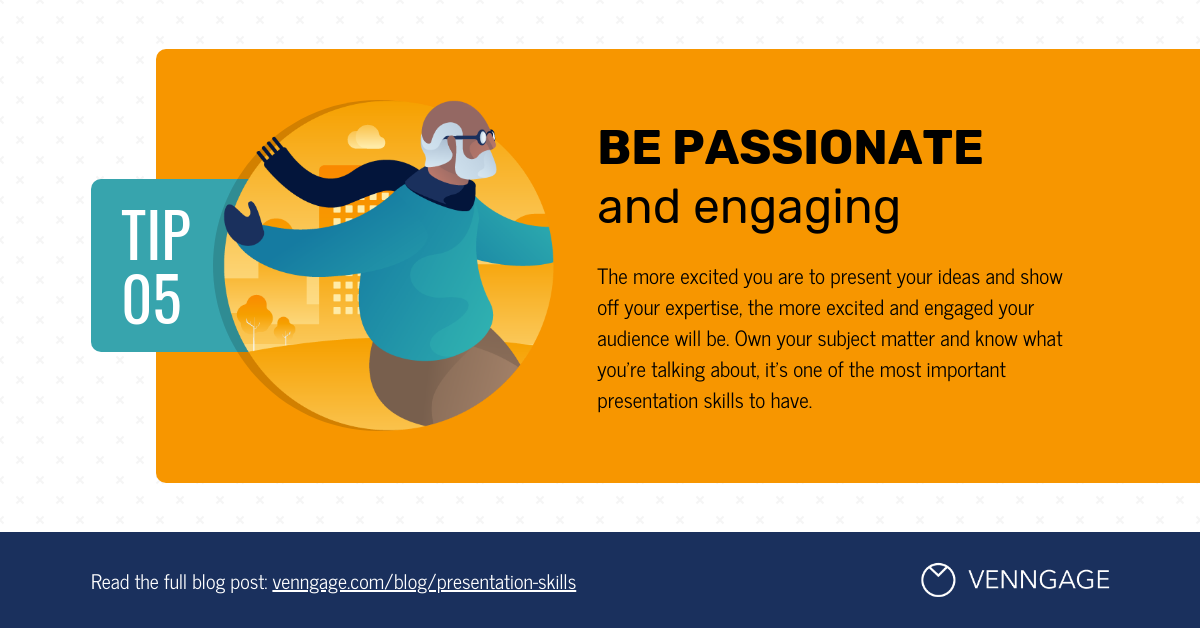
When creating your presentation, craft it in such a way that makes your audience curious and makes them have questions for you. A persuasive presentation is the best way to get the positive reactions you are looking for, so be as passionate as you can be about your subject matter to seal the deal.
Remember that questions and comments during your presentation are a good thing, especially if you’re the one prompting them!
The more excited you are to present your ideas and show off your expertise, the more excited and engaged your audience will be. Own your subject matter and know what you’re talking about, it’s one of the most important presentation skills to have.
6. Maintain eye contact with your audience

This is a very obvious tip that will go a long way with your audience.
When the people you’re speaking to feel like you’re taking notice of them, they are much more likely to take notice of you and pay better attention to everything that you’re saying.
It’s important to remember that losing eye contact and looking everywhere but at the people that you’re presenting to is a common nervous behavior. Pay extra close attention to whether or not you’re guilty of that, and work to ensure you have your eyes on at least one person.
7. Obsess over your listeners

Be receptive to your listeners. You can’t forget that what you’re presenting is for the audience, and it has nothing to do about you!
Focus on the value you can provide to the people in the room. The more serving you are to them, the greater chance you have at driving your point home and nailing your presentation.
It’s also important not to forget about those listening to you remotely over video conferencing . Make sure they know you’re aware of them and engage them as well!
8. Focus on confident body language

Smiling, hand gestures, eye contact, and a powerful stance all exude confidence.
If you don’t have strong body language and are showing physical signs of nervousness (ie. tapping, bouncing, shaking, darting eyes, and more) your audience will have a hard time focusing on the material you’re presenting and hone in on the fact that you’re nervous and probably don’t know what you’re talking about as much as you say you do.
No matter how nervous you are, take a deep breath and pretend otherwise. You might actually start to believe it!
9. Keep it as short as possible

Every single person’s time is valuable ( especially at work), so don’t waste precious meeting time. If you can say everything you need to in half of the time that is allotted, you should do so.
Ensure that you’re only sharing the most important information. All of the extra fluff will bore your audience and you will lose their attention very quickly.
It’s a great idea to wrap up your presentation with key takeaways and action items. Doing so will ensure that no matter how quickly your meeting ended, your team understands their next steps. You can send out a quick, summarizing slide deck or an easy to read one-pager for their reference later. These visuals will make sure all of your bases are covered and that everyone is on the same page upon leaving the meeting.
A good presentation makes all the difference. Check out the top qualities of awesome presentations and learn all about how to make a good presentation to help you nail that captivating delivery.
Never stop refining your presentation skills
Possessing great presentation skills doesn’t come naturally to most people–it’s something that’s learned and practiced over time. As with most things in life, you must continuously work on refining your skills to get better and better.
Use these nine proven presentation tips that we covered in this article to improve your presentation skills and ace different presentation styles . By doing so, you will find that presenting at your key meetings becomes easier and easier and you’ll begin to nail it every single time.
More presentation guides:
How to Make a Persuasive Presentation
120+ Best Presentation Ideas, Design Tips & Examples
33 Presentation Templates and Design Tips to Hold Your Audience’s Attention
Presentation Design Guide: How to Summarize Information for Presentations
21 Ways To Improve Your Presentation Skills
Published: April 07, 2023
You know the feeling of sitting through a boring presentation. A text distracts you. A noise outside pulls your gaze. Your dog begs for attention. By the time the presentation ends, you question why you needed to sit and listen in the first place.

Effective presentation skills can stop you from boring an audience to oblivion. Delivering strong presentations can help you stand out as a leader, showcase your expertise, and build confidence.
Table of contents:
- Presentation skills definition
- Importance of presentation skills
- How to improve presentation skills
- Effective presentation skills
- Presentation skills for executives
![presentation skills need → Free Download: 10 PowerPoint Presentation Templates [Access Now]](https://no-cache.hubspot.com/cta/default/53/2d0b5298-2daa-4812-b2d4-fa65cd354a8e.png)
Presentation Skills Definition
Presentation skills include anything you need to create and deliver clear, effective presentations to an audience. This includes creating a compelling set of slides , ensuring the information flows, and keeping your audience engaged.
Speakers with strong presentation skills can perform the following tasks:
- Bring together different sources of information to form a compelling narrative
- Hook audiences with a strong beginning and end
- Ensure audiences engage with their content through questions or surveys
- Understand what their audience wants and needs from their presentation
Importance of Presentation Skills
At some point in your career, you will present something. You might pitch a startup to a group of investors or show your research findings to your manager at work. Those in leading or executive roles often deliver presentations on a weekly or monthly basis.
Improving your presentation skills betters different aspects of your working life, including the following:
Communication: Improving your presentation skills can make you a better communicator with your co-workers and friends.
Confidence: 75% of people fear public speaking. By working on your presentation skills, you can gain confidence when speaking in front of a crowd.
Creativity: You learn to understand how to use imagery and examples to engage an audience.
Management: Presentations involve pulling together information to form a succinct summary, helping you build project and time management skills.
How To Improve Presentation Skills
1. create an outline.
Before designing slides and writing a script, outline your presentation. Start with your introduction, segue into key points you want to make, and finish with a conclusion.
2. Practice, Practice, Practice
Almost 8 in 10 professionals practice their presentations for at least an hour. So, practice your presentation in the mirror or to a close friend.
3. Start With a Hook
When presenting, grab your audience with a hook. Consider starting with a surprising statistic or a thoughtful question before diving into the core information.
4. Stay Focused on Your Topic
You might want to cover everything under the sun, but information overload can overwhelm your audience. Instead, stay focused on what you want to cover. Aim for key points and avoid including unnecessary details.
5. Remember To Introduce Yourself
At the beginning of the presentation, introduce yourself. Kill any tension in the room by mentioning your name, your role, and any other helpful details. You could even mention a fun fact about yourself, putting the audience at ease.
6. Work on Your Body Language
55% of people look to nonverbal communication when judging a presentation. Straighten your back, minimize unnecessary gestures, and keep your voice confident and calm. Remember to work on these aspects when practicing.
7. Memorize Structure, Not Words
You might feel better knowing exactly what you want to say. But skip the script and stick to memorizing the key points of your presentation. For example, consider picking three to four phrases or insights you want to mention for each part of your presentation rather than line-by-line memorization.
8. Learn Your Audience
Before crafting a killer outline and slide deck, research your audience. Find out what they likely already know, such as industry jargon, and where they might need additional information. Remember: You're presenting for them, not you.
9. Reframe Your Anxiety as Excitement
A study conducted by Harvard Business School demonstrates that reframing your anxiety as excitement can improve performance. For example, by saying simple phrases out loud, such as “I’m excited,” you then adopt an opportunity-oriented mentality.
10. Get Comfortable With the Setting
If you plan to present in person, explore the room. Find where you’re going to stand and deliver your presentation. Practice looking into the seats. By decreasing the number of unknowns, you can clear your head and focus on the job.
11. Get Familiar With Technology
Presenting online has unique challenges, such as microphone problems and background noise. Before a Zoom presentation, ensure your microphone works, clean up your background, test your slides, and consider any background noise.
12. Think Positively
Optimistic workers enjoy faster promotions and happier lives. By reminding yourself of the positives — for example, your manager found your last presentation impressive — you can shake off nerves and find joy in the process.
13. Tell a Story
To engage your audience, weave storytelling into your presentation — more than 5 in 10 people believe stories hold their focus during a presentation. Consider ways to connect different parts of your slides into a compelling narrative.
14. Prepare for Questions
At the end of your presentation, your audience will likely have questions. Brainstorm different questions and potential answers so you’re prepared.
15. Maintain Eye Contact
Eye contact signals honesty. When possible, maintain eye contact with your audience. For in-person presentations, pay attention to each audience member. For online ones, stare at your camera lens as you deliver.
16. Condense Your Presentation
After you finish the first draft of your outline, think about ways to condense it. Short and sweet often keeps people interested instead of checking their phones.
17. Use Videos
Keep your audience’s attention by incorporating video clips when relevant. For example, videos can help demonstrate examples or explain difficult concepts.
18. Engage With Your Audience
Almost 8 in 10 professionals view presentations as boring. Turn the tide by engaging with your audience. Encourage audience participation by asking questions or conducting a live survey.
19. Present Slowly and Pause Frequently
When you get nervous, you talk faster. To combat this, remember to slow yourself down when practicing. Place deep pauses throughout your presentation, especially when transitioning between slides, as it gives you time to breathe and your audience time to absorb.
20. Start and End With a Summary
A summary at the start of a presentation can pique your audience’s interest. One at the end brings everything together, highlighting key points your audience should take with them.
21. Ask for Feedback
You will never deliver the perfect presentation, so ask for feedback. Talk to your managers about where you could improve. Consider surveying your audience for an unbiased look into your presentation skills.

Effective Presentation Skills
Effective presentation skills include communicating clearly, presenting with structure, and engaging with the audience.
As an example, say a content manager is presenting a quarterly review to their team. They start off with a summary. Their introduction mentions an unprecedented 233% growth in organic traffic — numbers their team has not seen in years. Immediately, the presenter grabs their team’s attention. Now, everyone wants to know how they achieved that in one quarter.
Alternatively, think of an entrepreneur delivering their pitch to a group of investors. They start with a question: How many of you struggle to stay awake at work? They then segue into an exciting product designed to improve the sleep quality of working professionals. Their presentation includes videos demonstrating the science behind sleep and surprising statistics about the demand for their product.
Both examples demonstrate effective presentation skills. They incorporate strong attention grabbers, summaries, and attempts to engage the audience.
Think back to strong presentations you viewed as an audience member. Ask yourself: What made them so memorable, and how can I incorporate those elements into my presentations?
Presentation Skills for Executives
Presentations take up a significant portion of an executive’s workload. Executives regularly showcase key company initiatives, team changes, quarterly and annual reviews, and more. Improving your presentation skills as a leader can help with different parts of your job, such as:
Trust: Delivering great, effective presentations can build trust between you and your team.
Confidence: Most people dread presentations — so a strong presenter projects the confidence needed by a leader.
Emotional intelligence: A great presentation taps into the audience’s perspectives, helping executives improve their emotional intelligence .
Expertise: Presentations help executives display their subject-matter expertise, making employees safe in their hands.
Delegation: At times, executives might need to pull information from different sources for a presentation — improving their ability to delegate as managers.

What did you think of this article?
Give Feedback

Don't forget to share this post!
Outline your company's sales strategy in one simple, coherent plan.
Powerful and easy-to-use sales software that drives productivity, enables customer connection, and supports growing sales orgs

10 Presentation Skills That Every Great Presenter Must Have
It’s no secret that effective presentations can help you get ahead in business. After all, what better way to show off your knowledge and expertise than by delivering a well-crafted presentation? The right presentation skills give you the ability to share your ideas with an audience convincingly and engagingly.
Unfortunately, not everyone is born a natural presenter. If you’re not used to standing up in front of an audience, the prospect of doing so can be daunting. Fortunately, there are a few simple things you can do to improve your presentation skills.
In this article, we’ll share some tips on how to do just that, allowing you to deliver an effective presentation.
Let’s get right into it.
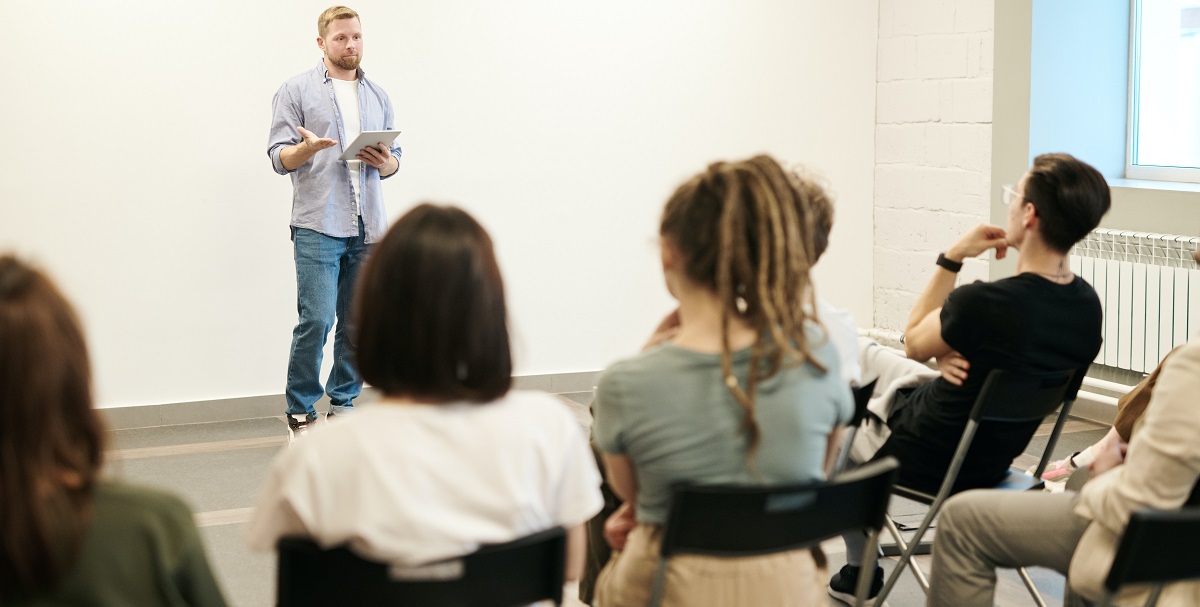
What are Presentation Skills?
Presentation skills are the abilities you need to deliver a clear and effective presentation. After all, a good presenter is someone who can communicate their ideas in a way that engages and motivates their audience.
There are many different aspects to presentation skills, from knowing how to structure your talk to using visuals effectively, to dealing with nerves.
Developing strong presentation skills will help you to communicate your ideas more effectively and make a positive impression on your audience.
Presentation skills are important because they can help you to communicate your ideas clearly and effectively. A good presentation can make a big impact on your audience and can help to persuade them of your point of view.
Presentation skills are also important in other areas of life, such as job interviews, sales pitches, and networking events. Being able to present your ideas clearly and concisely can give you a big advantage over others who are not as confident in their presentation skills.
Why Is it Important To Recognize Presentation Skills & Their Benefits?
One of the most important reasons to recognize presentation skills is because they are a valuable skill for any profession. Good presentation skills can help you in your career by making it easier to sell your ideas, get promoted, and be successful in business.
In addition, good presentation skills can also help you in your personal life by making it easier to give speeches, make presentations, and teach classes.
In addition, recognizing presentation skills can also help you improve your presentations. If you are not aware of the importance of presentation skills, you may not be using them to their full potential.
By taking the time to learn about presentation skills and how to use them effectively, you can make your presentations more effective and persuasive.
Here’s a list of benefits that come with good presentation skills:
- Increased confidence
- The ability to think on your feet
- Improved public speaking skills
- Enhanced written communication skills
- The ability to lead and motivate others
- Enhanced problem-solving abilities
- Improved negotiation skills
- Stronger time management skills
- Greater creativity
- The opportunity to make a positive impact on others

10 Examples of Presentation Skills
Let’s now explore some practical examples of presentation skills that will help you ace your next big presentation.
A Clear And Confident Voice
One of the most important aspects of a great presentation is having a clear and confident voice. If you’re mumbling or speaking too quietly, your audience is going to have a hard time understanding you.
On the other hand, if you’re shouting or speaking too fast, they’re going to get overwhelmed and tune out. So, it’s important to find that happy medium where your voice is audible and easy to understand.
The Ability To Engage With Your Audience
Another key presentation skill is the ability to engage with your audience. This means making eye contact, using gestures, and speaking in a way that is relatable and easy to understand.
If you’re just standing there reading off a slide, chances are your audience is going to get bored pretty quickly. But if you can find ways to keep them engaged, they’ll be more likely to listen to what you have to say.
Good Eye Contact
One of the best ways to engage with your audience is through eye contact. When you make eye contact with someone, it shows that you’re interested in what they have to say and that you’re engaged in the conversation. It also helps to build trust and rapport.
So, if you can find ways to make eye contact with your audience members, it will go a long way in keeping them engaged.
Natural Gestures
Another great way to engage with your audience is through natural gestures. Using your hands and arms to gesture can help emphasize points and keep your audience engaged. Just be sure not to go overboard – too much gesturing can be distracting.
Positive Body Language
Your body language is also important when it comes to presentations. If you’re slouching or looking down at your feet, it’s going to show that you’re not confident in what you’re saying.
On the other hand, if you’re standing up straight and making strong eye contact, it’s going to give off a positive impression. So, be aware of your body language and try to project confidence through it.
The Use Of Visual Aids
Visual aids can be a great way to engage your audience and make your points more clear. Using slides, charts, and graphs can help illustrate your ideas and make them easier to understand. Similar to using gestures, just be sure not to overdo it – too many visuals can be overwhelming and confusing.
The Ability To Handle Questions
At some point during your presentation, you’re likely going to get questions from your audience; how you handle those questions can make or break your presentation. If you’re able to answer them confidently and without getting flustered, it’ll show that you know your stuff.
But if you start to get tongue-tied or defensive, it’s going to reflect poorly on you. So, be prepared for questions and try to stay calm when answering them.
An Organized Structure
Another important presentation skill is having a well-organized structure. This means having an introduction, main body, and conclusion to your presentation.
It also means using transitions between sections to help your audience follow along. If your presentation is all over the place, it’s going to be hard for your audience to stay engaged and they’ll quickly tune out.
The Use Of Storytelling
Storytelling is a great way to engage your audience and make your points more memorable. And while it might not seem like a traditional presentation skill, it can be extremely effective. So, if you can find ways to weave stories into your presentation, it’ll go a long way in captivating your audience.
Last but not least, confidence is one of the most important presentation skills you can have. If you’re not confident in what you’re saying, it’s going to show – and your audience is going to pick up on it.
So, even if you’re not feeling 100% sure of yourself, try to project confidence. It’ll make a big difference in how your audience perceives you and your message.

How To Identify & Master Presentation Skills
The good news is that presentation skills are not rocket science. Anyone can develop and master them with the right guidance.
Here’s a 5-step process to help you identify and master presentation skills.
Determine The Purpose Of Your Presentation
Are you trying to inform, persuade, or entertain your audience? Knowing the purpose of your presentation will help you focus on the right content and delivery.
Know Your Audience
Who will be watching or listening to your presentation? What are their needs, wants, and concerns? The better you understand your audience, the more effectively you can address their needs.
Structure Your Content
Organize your thoughts into an introduction, body, and conclusion. The introduction should grab your audience’s attention and set the stage for the rest of your presentation. The body should contain the meat of your argument, and the conclusion should drive home your main points.
Choose Your Delivery Method
Will you be using slides, props, or other visual aids? Will you be speaking extemporaneously or reading from a script? Choose a delivery method that best suits your content and audience.
Practice, Practice, Practice
The only way to become a master presenter is to practice, practice, practice! Experiment with different techniques and find what works best for you. Then keep practicing until it becomes second nature.
Also, consider that the right strengths test can help you understand your presentation skills better – both the strong ones and the ones to get better at. To this extent, the High5test.com strengths test is a great resource.
How To Improve Presentation Skills in The Workplace
The workplace is one of the most important places to hone your presentation skills. After all, in the business world, first impressions are key, and being able to deliver a polished and professional presentation can make all the difference in whether or not you’re successful.
Here are a few tips to help you improve your presentation skills in the workplace:
Preparation Is Key
This may seem like a no-brainer, but it’s worth repeating. When you’re preparing for a presentation, take the time to do your research and gather all of the necessary information. This will help ensure that your presentation is well-organized and flows smoothly.
Be Aware Of Your Body Language
Your body language speaks volumes, so it’s important to be aware of what you’re communicating with your nonverbal cues. Make sure you’re standing up straight, making eye contact, and using gestures appropriately. These small tweaks can make a big difference in how your audience perceives you.
One of the best ways to improve your presentation skills is simply to practice as much as you can. The more you present, the more comfortable you’ll become and the better you’ll be at thinking on your feet and handling questions from the audience.
Seek Feedback
After each presentation, take some time to reflect on what went well and what could be improved. If possible, seek feedback from your colleagues or boss. This will help you learn from your mistakes and continue to improve.
By following these tips, you can start to improve your presentation skills and make a positive impression in the workplace.
How To Highlight Presentation Skills In Resume & Job Interview
Another important skill that is often overlooked is the ability to highlight presentation skills in both a resume and a job interview. This can be the difference between getting the job and not.
When you are applying for a job, your resume is often the first thing that potential employers will look at. It is important to make sure that your resume includes any relevant presentation skills that you may have.
You can do this by including any experience you have in public speaking, leading presentations, or teaching courses. If you do not have any experience in these areas, consider listing any other relevant skills that could transfer over into presenting, such as customer service or sales experience.
In addition to your resume, it is also important to be able to highlight your presentation skills during a job interview. This is often done through behavioral interviewing, where you will be asked to describe specific examples of times when you have presented in the past. It is important to be prepared for this type of question and to have a few examples ready to go.
When you are highlighting your presentation skills, it is important to focus on any successes that you have had. This could be anything from getting positive feedback from an audience to successfully teaching a new course.
No matter what the specific example is, it is important to focus on how you were able to positively impact the situation. This will show potential employers that you can effectively present information and that you are someone they would want on their team.
Bonus Tip: How to Improve Presentation Skills in School As a Student
School students often have to present in front of their classmates and teachers. This can be a daunting experience, especially if you don’t feel confident in your abilities. However, there are some things you can do to improve your presentation skills while you’re still in school.
Join A Club Or Organization That Requires Presentations
This will force you to get up in front of people regularly and hone your skills. If no club or organization at your school requires presentations, start one!
Give speeches in front of the mirror.
Practicing in front of a mirror can help you identify any nervous habits you have (like fidgeting or pacing) and correct them before you have to give a real speech.
Use Note Cards Instead Of A Script
Reading from a script can make you sound robotic and unauthentic. Note cards will help you stay on track without sounding like you’re reciting memorized lines.
Record Yourself Giving A Presentation
Then, watch the recording back to see how you can improve. This exercise can be painful, but it’s one of the best ways to identify your weaknesses and work on them.
Find A Mentor
Ask a teacher or another adult you trust to give you feedback on your presentations. They can offer helpful tips and criticism that will help you improve.
By following these tips, you’ll be well on your way to becoming a great presenter in no time!
Presentation Skills FAQs
What are the 7 presentation skills.
The 7 presentation skills are:
- Eye contact
What are the 4 types of presentation skills?
The 4 types of presentation skills are:
- Verbal communication
- Visual aids
- Non-verbal communication
- Listening skills
What is the rule of presentation?
The rule of presentation is to always keep the audience in mind. This means knowing who your audience is, what they want to hear, and how to best deliver your message so that they will listen and be able to understand it.

Related Posts

What are Problem-Solving Skills? Examples & How To Develop Them

What are Interpersonal Skills? 20 Examples To Use for a Resume or CV

Life Skills: Definition, Examples & How To Develop Them

10 Accounting Skills That Every Great Accountant Must Have

10 Crucial Marketing Skills That Every Marketer Must Have

10 Employability Skills That Employers Value The Most
HIGH5 is a strengths test to unlock the full potential of individuals, teams and organizations by identifying and maximizing what motivates and energizes them.
Join over 4 000 000 happy test takers:
Free Strengths Test
Methodology
Affiliate Program
Feature Request
Help Center
CliftonStrengths
VIA Character Strengths
Comparisons
For individuals
For organizations
For coaches
For educators
Talent development
Leadership development
Team development
Diversity & Inclusion
Employee engagement
Change management
Full Strengths Report
Team Strengths Report
Strengths Planner
Strengths Discovery Guide
Strengths Reference Sheets
Strength Cards
Career Guides
Professional Skills
Job Interview Guides
Strengths in the Workplace
Copyright @ 2024 HIGH5TEST. All rights reserved. Terms & Conditions . Privacy Policy . Shipping Policy . Contact Info .

- Search Search Please fill out this field.
- Career Planning
- Skills Development
Important Presentation Skills for Workplace Success
:max_bytes(150000):strip_icc():format(webp)/ADHeadshot-Cropped-b80e40469d5b4852a68f94ad69d6e8bd.jpg)
- What Are Presentation Skills?
Steps To Create a Presentation
Skills that help make an effective presentation, how to make your skills stand out.
xavierarnau / Getty Images
Whether you’re a high-level executive or an administrative assistant, developing your presentation skills is one key way to climb in an office-based job. Leaders make decisions based on information shared in presentation format, and hardly any business changes its mind without first seeing a persuasive presentation.
It is important for any office employee to know what steps go into creating an effective presentation and what presentation skills are most important to employers. Highlighting these skills will also help you stand out during your job search.
Key Takeaways
- Presentation skills are what you need to know to be able to give an engaging, effective presentation.
- The steps to creating a successful presentation are preparation, delivery, and follow-up.
- Employers want to know you have the necessary skills to research, analyze, and create a presentation, plus the communication skills needed to deliver it and field questions afterward.
- You can highlight your skills to employers through your resume, cover letter, and interview.
What Are Presentation Skills?
Presentation skills refer to all the qualities you need to create and deliver a clear and effective presentation. While what you say during a presentation matters, employers also value the ability to create supporting materials, such as slides.
Your prospective employer may want you to deliver briefings and reports to colleagues, conduct training sessions, present information to clients, or perform any number of other tasks that involve speaking before an audience.
Giving engaging and easy-to-understand talks is a major component of the strong oral communication skills that are a job requirement for many positions. Not all presentations take place in a formal meeting. Many presentation skills are relevant to one-on-one consults or sales calls.
Any presentation has three phases: preparation, delivery, and follow-up. All presentation skills fit into one of these three phases.
Preparation
Preparation involves research and building the presentation. Consider the audience you'll be presenting to and what most interests them. This may mean crafting the entire text (or at least writing notes) and creating any slides and other supporting audio/visual materials.
You will also have to make sure that the appropriate venue is available, properly set up beforehand, and ensure the projector (if you'll need one) works and connects with your laptop.
You'll also want to practice your presentation as many times as you need to to feel comfortable delivering it with ease and confidence within the time allotted for the presentation.
Skills related to preparation include conducting research related to your presentation topic, devising charts and graphs depicting your research findings, and learning about your audience to better tailor your presentation to their needs. You'll also need to create digital slides, using statistics, examples, and stories to illustrate your points and effectively to persuade the audience.
Preparing handouts or digital references is an added courtesy that will help the audience pay attention because they won't be preoccupied with note-taking.
Your delivery is the part of the presentation that the audience sees. A good delivery depends on careful preparation and confident presentation and requires its own distinctive skill set .
Skills related to delivery include giving an attention-grabbing opening for a talk, providing a summary of what will be covered to introduce the presentation and provide context, and using body language and eye contact to convey energy and confidence.
Make sure you pause to emphasize key points, modulate your vocal tone for emphasis, and articulate your speech clearly and smoothly.
Don't be afraid of injecting humor or speaking with enthusiasm and animation—these techniques can help you in projecting confidence to your audience.
Summarize key points at the conclusion of the presentation, and be sure to have a plan for how you'll field any audience questions.
Presentation follow-up includes properly breaking down and storing any equipment, contacting any audience members with whom you agreed to communicate further, and soliciting, collecting, and analyzing feedback.
In some presentations, you may collect information from audience members—such as names and contact information or completed surveys—that you also must organize and store.
Skills related to follow-up include creating an evaluation form to solicit feedback from attendees, interpreting feedback from evaluations, and modifying the content and/or delivery for future presentations. Other follow-up skills include organizing a database of attendees for future presentations, interviewing key attendees to gain additional feedback, and emailing presentation slides to attendees.
To create and deliver the most effective presentation takes a variety of skills, which you can always work to improve.
You must be able to look honestly at your performance, assess the feedback you get, and figure out what you need to do to get better. That takes analytical thinking .
More importantly, you need to have a firm grasp of the information you are about to communicate to others. You need to analyze your audience and be prepared to think quickly if asked questions that force you to demonstrate that you are fully aware of the material and its implications.
The kind of analytical skills you need to be an effective presenter include problem sensitivity, problem-solving , reporting and surveying, optimization, and predictive modeling. It also helps to be adept at strategic planning, integration, process management, and diagnostics. With these skills, you'll be better able to objectively analyze, evaluate, and act on your findings.
Organization
You do not want to be the person who spends half of their presentation time trying to find a cable to connect their laptop to the projector. Many things can and do go wrong just before a presentation unless you are organized .
Presentation preparation also means keeping track of notes, information, and start/stop times. You will want to proofread and fine-tune all the materials you plan to use for the presentation to catch any mistakes. Make sure you time yourself when you rehearse so you know how long it will take to deliver the presentation.
A presentation that's finished in half the time allotted is as problematic as one that's too long-winded.
Some key organizational skills to work on include event planning, auditing, benchmarking, prioritization, and recordkeeping. Make sure your scheduling is on point and pay close attention to detail. Quick thinking is an important skill to have for when things inevitably go wrong.
Nonverbal Communication
When speaking to an audience, the way you present yourself can be just as important as how you present your information. You want to appear confident and engaging. You can do this through good posture, the use of hand gestures, and making eye contact with the audience.
Practice your nonverbal communication by filming yourself doing a practice presentation and observing your body language carefully. Your physical bearing and poise should convey a degree of comfort and confidence in front of an audience, while active listening , respect, and emotional intelligence will help you in facilitating group discussions.
Presentation Software
Microsoft PowerPoint is the dominant software used to create visual aids for presentations. Learn to use it well, including the special features outside of basic templates that can really bring a presentation to life. Even if someone else is preparing your slideshow for you, it will help to know how to use the software in case of last-minute changes.
Other software that is good to learn includes Microsoft Office, Apple Keynote, Google Slides, and Adobe Presenter.
Public Speaking
You need to appear comfortable and engaging when speaking before a live audience, even if you're not. This can take years of practice, and sometimes public speaking just isn't for certain people. An uncomfortable presenter is a challenge for everyone. Fortunately, public speaking skills can improve with practice . Some skills to work on include articulation, engagement, and memorization. You should be able to assess the needs of the audience and handle difficult questions. Controlling your performance anxiety will help you communicate more effectively.
Research is the first step in preparing most presentations and could range from a multi-year process to spending 20 minutes online, depending on context and subject matter. At the very least, you must be able to clearly frame research questions, identify appropriate information sources, and organize your results. Other useful skills include brainstorming, collaboration , comparative analysis, data interpretation, and deductive and inductive reasoning. Business intelligence is a skill that will help you evaluate what information you need to support the bottom line, while case analysis and causal relationships will help you parse and evaluate meaning.
Verbal Communication
Public speaking is one form of verbal communication , but you will need other forms to give a good presentation. Specifically, you must know how to answer questions. You should be able to understand questions asked by your audience (even if they're strange or poorly worded) and provide respectful, honest, and accurate answers without getting off-topic. Use active listening, focus, and empathy to understand your audience. Skills such as assertiveness, affirmation, and enunciation will help you restate and clarify your key points as it relates to their questions or concerns.
You may or may not need a written script, but you do need to pre-plan what you are going to say, in what order you will say it, and at what level of detail. If you can write a cohesive essay, you can plan a presentation.
Typical writing skills apply to your presentation just as they do to other forms of writing, including grammar, spelling, vocabulary, and proofreading. The ability to build outlines, take notes, and mark up documents will also be useful.
More Presentation Skills
In addition to the skills previously mentioned, there are other important skills that can apply to your presentation. The other skills you need will depend on what your presentation is about, your audience, and your intended results. Some of these additional skills include:
- Summarizing
- Providing anecdotes to illustrate a point
- Designing handouts
- Recognizing and countering objections
- Posing probing questions to elicit more detail about specific issues
- Awareness of ethnic, political, and religious diversity
- Receiving criticism without defensiveness
- Refraining from speaking too often or interrupting others
- Anticipating the concerns of others
- Product knowledge
- SWOT analysis format
- Supporting statements with evidence
- Multilingual
- Working with reviewers
- Consistency
- Developing and maintaining standard operating procedures (SOPs)
- Developing a proposition statement
- Creating and managing expectations
Include skills on your resume. If applicable, you might mention these words in your resume summary or headline .
Highlight skills in your cover letter. Mention one or two specific presentation skills and give examples of instances when you demonstrated these traits in the workplace.
Show your presentation skills in job interviews. During the interview process, you may be asked to give a sample presentation. In this case, you will want to embody these skills during the presentation. For example, you will want to demonstrate your oral communication skills by speaking clearly and concisely throughout the presentation.
PennState. " Steps in Preparing a Presentation ."
Harvard Division of Continuing Education. " 10 Tips for Improving Your Public Speaking Skills ."
Northern Illinois University. " Delivering the Presentation ."
- Presentation Skills
- Skills & Tools
Presentation skills can be defined as a set of abilities that enable an individual to: interact with the audience; transmit the messages with clarity; engage the audience in the presentation; and interpret and understand the mindsets of the listeners. These skills refine the way you put forward your messages and enhance your persuasive powers.
The present era places great emphasis on good presentation skills. This is because they play an important role in convincing the clients and customers. Internally, management with good presentation skills is better able to communicate the mission and vision of the organization to the employees.
Importance of Presentation Skills
Interaction with others is a routine job of businesses in today’s world. The importance of good presentation skills is established on the basis of following points:
- They help an individual in enhancing his own growth opportunities. In addition, it also grooms the personality of the presenter and elevates his levels of confidence.
- In case of striking deals and gaining clients, it is essential for the business professionals to understand the audience. Good presentation skills enable an individual to mold his message according to the traits of the audience. This increases the probability of successful transmission of messages.
- Lastly, business professionals have to arrange seminars and give presentations almost every day. Having good presentation skills not only increases an individual’s chances of success, but also enable him to add greatly to the organization.
How to Improve Presentation Skills
Development of good presentation skills requires efforts and hard work. To improve your presentation skills, you must:
- Research the Audience before Presenting: This will enable you to better understand the traits of the audience. You can then develop messages that can be better understood by your target audience. For instance, in case of an analytical audience, you can add more facts and figures in your presentation.
- Structure your Presentation Effectively: The best way to do this is to start with telling the audience, in the introduction, what you are going to present. Follow this by presenting the idea, and finish off the presentation by repeating the main points.
- Do a lot of Practice: Rehearse but do not go for memorizing the presentation. Rehearsals reduce your anxiety and enable you to look confident on the presentation day. Make sure you practice out loud, as it enables you to identify and eliminate errors more efficiently. Do not memorize anything as it will make your presentation look mechanical. This can reduce the degree of audience engagement.
- Take a Workshop: Most medium and large businesses allow their employees to take employee development courses and workshops, as well-trained employees are essential to the success of any company. You can use that opportunity to take a workshop on professional presentation skills such as those offered by Langevin Learning Services , which are useful for all business professionals, from employees to business trainers and managers.
Job profiles that require this skill

Not yet a member? Sign Up
join cleverism
Find your dream job. Get on promotion fasstrack and increase tour lifetime salary.
Post your jobs & get access to millions of ambitious, well-educated talents that are going the extra mile.
First name*
Company name*
Company Website*
E-mail (work)*
Login or Register
Password reset instructions will be sent to your E-mail.

- SUGGESTED TOPICS
- The Magazine
- Newsletters
- Managing Yourself
- Managing Teams
- Work-life Balance
- The Big Idea
- Data & Visuals
- Reading Lists
- Case Selections
- HBR Learning
- Topic Feeds
- Account Settings
- Email Preferences
Your In-Person Presentation Skills Need a Refresh
- Deborah Grayson Riegel

Live presentations are making a comeback.
As most workplaces and institutions shift to a hybrid model, many of us are getting back to presenting in rooms where the audience is physically present. If you’ve also started to make this shift, here are four in-person presentation skills that could probably use some refreshing:
- Look at your audience to form a personal connection. Making eye contact can be hard to do, particularly if you’re feeling nervous, trying to read your slides, or were brought up in a culture that considers assertive eye contact to be rude. Furthermore, with neurodiverse professionals — for some of whom making eye contact can feel challenging and even antithetical to learning — forcing it can undermine efforts to take in and deliver meaningful information.
- Where there are psychosocial or cultural barriers, one option is to make “eye-adjacent” contact, where you look at someone’s mouth, nose, forehead, or a spot on the horizon just past their eyes. For those who feel comfortable and want to practice improving their eye contact, start small. Aim to make brief but meaningfully connections by looking at different members of your audience.
- Prepare beforehand to avoid sounding scripted. Practice delivering the content orally at least three times before the actual presentation, so that you have “muscle memory” of the content.
- Use prompts to engage people. Intentionally engaging your audience in person can facilitate learning and understanding, give participants opportunities to ask questions, and makes you come across as a more confident, competent presenter.
- Pay attention to your body language. Using facial expressions, hand gestures, and moving around the space you’re presenting in (if you are able and open to doing so) can increase the energy of the room, help people feel more involved or included, and even make you more interesting to watch and listen to.
Three years ago, the way we shared presentations at work (and school) drastically changed. Anyone used to presenting in person had to adapt, revise, and change their public speaking strategies. Whether you were a student sharing work with your class, a sales associate pitching to prospects, a consultant advising clients, or in any other field, you likely shifted your mindset and skills to make the most of presenting virtually.
- Deborah Grayson Riegel is a professional speaker and facilitator, as well as a communication and presentation skills coach. She teaches leadership communication at Duke University’s Fuqua School of Business and has taught for Wharton Business School, Columbia Business School’s Women in Leadership Program, and Peking University’s International MBA Program. She is the author of Overcoming Overthinking: 36 Ways to Tame Anxiety for Work, School, and Life and the best-selling Go To Help: 31 Strategies to Offer, Ask for, and Accept Help .
Partner Center

- PRESENTATION SKILLS
What is a Presentation?
Search SkillsYouNeed:
Presentation Skills:
- A - Z List of Presentation Skills
- Top Tips for Effective Presentations
- General Presentation Skills
- Preparing for a Presentation
- Organising the Material
- Writing Your Presentation
- Deciding the Presentation Method
- Managing your Presentation Notes
- Working with Visual Aids
- Presenting Data
- Managing the Event
- Coping with Presentation Nerves
- Dealing with Questions
- How to Build Presentations Like a Consultant
- 7 Qualities of Good Speakers That Can Help You Be More Successful
- Self-Presentation in Presentations
- Specific Presentation Events
- Remote Meetings and Presentations
- Giving a Speech
- Presentations in Interviews
- Presenting to Large Groups and Conferences
- Giving Lectures and Seminars
- Managing a Press Conference
- Attending Public Consultation Meetings
- Managing a Public Consultation Meeting
- Crisis Communications
- Elsewhere on Skills You Need:
- Communication Skills
- Facilitation Skills
- Teams, Groups and Meetings
- Effective Speaking
- Question Types
Subscribe to our FREE newsletter and start improving your life in just 5 minutes a day.
You'll get our 5 free 'One Minute Life Skills' and our weekly newsletter.
We'll never share your email address and you can unsubscribe at any time.
The formal presentation of information is divided into two broad categories: Presentation Skills and Personal Presentation .
These two aspects are interwoven and can be described as the preparation, presentation and practice of verbal and non-verbal communication.
This article describes what a presentation is and defines some of the key terms associated with presentation skills.
Many people feel terrified when asked to make their first public talk. Some of these initial fears can be reduced by good preparation that also lays the groundwork for making an effective presentation.
A Presentation Is...
A presentation is a means of communication that can be adapted to various speaking situations, such as talking to a group, addressing a meeting or briefing a team.
A presentation can also be used as a broad term that encompasses other ‘speaking engagements’ such as making a speech at a wedding, or getting a point across in a video conference.
To be effective, step-by-step preparation and the method and means of presenting the information should be carefully considered.
A presentation requires you to get a message across to the listeners and will often contain a ' persuasive ' element. It may, for example, be a talk about the positive work of your organisation, what you could offer an employer, or why you should receive additional funding for a project.
The Key Elements of a Presentation
Making a presentation is a way of communicating your thoughts and ideas to an audience and many of our articles on communication are also relevant here, see: What is Communication? for more.
Consider the following key components of a presentation:
Ask yourself the following questions to develop a full understanding of the context of the presentation.
When and where will you deliver your presentation?
There is a world of difference between a small room with natural light and an informal setting, and a huge lecture room, lit with stage lights. The two require quite different presentations, and different techniques.
Will it be in a setting you are familiar with, or somewhere new?
If somewhere new, it would be worth trying to visit it in advance, or at least arriving early, to familiarise yourself with the room.
Will the presentation be within a formal or less formal setting?
A work setting will, more or less by definition, be more formal, but there are also various degrees of formality within that.
Will the presentation be to a small group or a large crowd?
Are you already familiar with the audience?
With a new audience, you will have to build rapport quickly and effectively, to get them on your side.
What equipment and technology will be available to you, and what will you be expected to use?
In particular, you will need to ask about microphones and whether you will be expected to stand in one place, or move around.
What is the audience expecting to learn from you and your presentation?
Check how you will be ‘billed’ to give you clues as to what information needs to be included in your presentation.
All these aspects will change the presentation. For more on this, see our page on Deciding the Presentation Method .
The role of the presenter is to communicate with the audience and control the presentation.
Remember, though, that this may also include handing over the control to your audience, especially if you want some kind of interaction.
You may wish to have a look at our page on Facilitation Skills for more.
The audience receives the presenter’s message(s).
However, this reception will be filtered through and affected by such things as the listener’s own experience, knowledge and personal sense of values.
See our page: Barriers to Effective Communication to learn why communication can fail.
The message or messages are delivered by the presenter to the audience.
The message is delivered not just by the spoken word ( verbal communication ) but can be augmented by techniques such as voice projection, body language, gestures, eye contact ( non-verbal communication ), and visual aids.
The message will also be affected by the audience’s expectations. For example, if you have been billed as speaking on one particular topic, and you choose to speak on another, the audience is unlikely to take your message on board even if you present very well . They will judge your presentation a failure, because you have not met their expectations.
The audience’s reaction and therefore the success of the presentation will largely depend upon whether you, as presenter, effectively communicated your message, and whether it met their expectations.
As a presenter, you don’t control the audience’s expectations. What you can do is find out what they have been told about you by the conference organisers, and what they are expecting to hear. Only if you know that can you be confident of delivering something that will meet expectations.
See our page: Effective Speaking for more information.
How will the presentation be delivered?
Presentations are usually delivered direct to an audience. However, there may be occasions where they are delivered from a distance over the Internet using video conferencing systems, such as Skype.
It is also important to remember that if your talk is recorded and posted on the internet, then people may be able to access it for several years. This will mean that your contemporaneous references should be kept to a minimum.
Impediments
Many factors can influence the effectiveness of how your message is communicated to the audience.
For example background noise or other distractions, an overly warm or cool room, or the time of day and state of audience alertness can all influence your audience’s level of concentration.
As presenter, you have to be prepared to cope with any such problems and try to keep your audience focussed on your message.
Our page: Barriers to Communication explains these factors in more depth.
Continue to read through our Presentation Skills articles for an overview of how to prepare and structure a presentation, and how to manage notes and/or illustrations at any speaking event.
Continue to: Preparing for a Presentation Deciding the Presentation Method
See also: Writing Your Presentation | Working with Visual Aids Coping with Presentation Nerves | Dealing with Questions Learn Better Presentation Skills with TED Talks

How it works
For Business
Join Mind Tools
Presentation Skills
29 Resources
Giving presentations can be a daunting task for even the most experienced public speaker. Assess and develop your presentation skills using practical knowledge and tips, designed to help you prepare for, deliver and evaluate great presentations.
Explore Presentation Skills topics

Get 20% off your first year of Mind Tools
Our on-demand e-learning resources let you learn at your own pace, fitting seamlessly into your busy workday. Join today and save with our limited time offer!
Expert Interviews
The Art of Public Speaking
With Professor Steve Lucas
Presenting With Confidence
With Cordelia Ditton
Great Presentations
Managing presentation nerves.
How to Calm Your Stage Fright
Infographic
10 Common Presentation Mistakes Infographic
Infographic Transcript
Even Better Presentations
Creating effective presentation visuals.
Connecting People With Your Message
Giving Presentations on a Web Conferencing Platform
Self-Assessment
How Good Are Your Presentation Skills?
Understanding Your Impact
Visual Aids Checklist
Ensure That the Visual Aids You Choose to Use in Your Presentations Are Fit for Purpose
How to Structure a Presentation
Choosing the Best Format for Your Audience
The Presentation Planning Checklist
Better public speaking.
Becoming a Confident, Compelling Speaker
Crafting an Elevator Pitch
Introducing Your Company Quickly and Compellingly
How to Guides
Taking Questions After a Presentation
A Process for Answering the Audience
Could You Say a Few Words?
A Four-Step Strategy for Impromptu Speaking
Effective Presentations
Learn How to Present Like a Pro
Speaking to an Audience
Communicate Complex Ideas Successfully
5 Funky Presentation Techniques Infographic
4 steps for conquering presentation nerves.
Banish Your Stage Fright
Business Skills
Personal Development
Leadership and Management
Member Extras
Most Popular
Newest Releases

Pain Points Podcast - Balancing Work And Kids

Pain Points Podcast - Improving Culture
Mind Tools Store
About Mind Tools Content
Discover something new today
Pain points podcast - what is ai.
Exploring Artificial Intelligence
Pain Points Podcast - How Do I Get Organized?
It's Time to Get Yourself Sorted!
How Emotionally Intelligent Are You?
Boosting Your People Skills
What's Your Leadership Style?
Learn About the Strengths and Weaknesses of the Way You Like to Lead
Recommended for you
Where keynes went wrong and why world governments keep creating inflation, bubbles and busts.
Hunter Lewis
Book Insights
Business Operations and Process Management
Strategy Tools
Customer Service
Business Ethics and Values
Handling Information and Data
Project Management
Knowledge Management
Self-Development and Goal Setting
Time Management
Learning Skills
Career Skills
Communication Skills
Negotiation, Persuasion and Influence
Working With Others
Difficult Conversations
Creativity Tools
Self-Management
Work-Life Balance
Stress Management and Wellbeing
Coaching and Mentoring
Change Management
Team Management
Managing Conflict
Delegation and Empowerment
Performance Management
Leadership Skills
Developing Your Team
Talent Management
Problem Solving
Decision Making
Member Podcast
More From Forbes
Quotes for inspiration ahead of your next presentation.
- Share to Facebook
- Share to Twitter
- Share to Linkedin
George Washington before the Constitutional Convention at Philadelphia, 1787.
Since the dawn of humankind, speaking in front of a large audience has been, and remains, a daunting task. So daunting, in fact, that many of us are paralyzed with fear when required to make a speech or presentation. Therefore, for anyone seeking inspiration before preparing their next oral presentation, here are a few useful quotes on the art of public speaking – from writing a speech, to rehearsing it, to ultimately delivering it on stage.
Transposing a flurry of ideas in your head into short, clear sentences on a page is arguably the hardest and most time-consuming part of preparation. “That which is well conceived becomes clearly enunciated, and the words to say it come effortlessly.” French poet Nicolas Boileau, writing in 1674, provides a useful reminder that before clear writing and clear speaking comes clear thinking. No idea can be convincingly delivered if it hasn’t first been revamped into simpler, more direct language. Complex ideas, structures and expressions rarely sway audiences, who tune-out what they don’t immediately grasp.
As humbling as it may be to admit, audiences rarely give speakers the kind of undivided attention and active listening that speakers expect. Therefore, time management is key. Remember to KISS ( K eep I t S hort & S imple) since audience attention fades quickly. Thomas Jefferson writing to a friend in 1773, said, “ The most valuable of all talents is never using two words when one will do. ” The impact and memorability of a presentation is a function of how much meaning is packed into the shortest amount of speaking time. Think of it like an equation: Impact = amount of meaning divided by number of words.
Or, to put it back into plain English: cutting unnecessary words will boost the impact of your speech. For example:
- Use a stronger verb to replace a vague verb + adverb (‘run,’ versus ‘go quickly,’ uses 1 word instead of 2.)
- Use the active voice in place of the passive voice (‘Phillip sang a song,’ versus, ‘A song was sung by Phillip,’ uses 4 words instead of 6.)
- Use plain language, words understood by the widest audience (to ‘send’ versus to ‘dispatch’ )
On Rehearsal
“ A study said speaking in front of a crowd is considered the number one fear of the average person…Number two is death. ” Comedian Jerry Seinfeld created a memorable bit out of this relatable fear.
Apple Just Released A Major Upgrade For Samsung Galaxy Watch 6, Pixel Watch
Trump posts 175 million bond thanks to billionaire don hankey, caitlin clark erupts for 41 points as iowa advances to final four with revenge win over lsu.
You can overcome stage fright through rehearsal. Americans are fond of saying “fake it ‘till you make it,” and perhaps there is a nugget of truth to this expression when it comes to public speaking. In 1879, Mark Twain put it this way, “I never could make a good impromptu speech without several hours to prepare it.” A good speech should appear effortless, almost spontaneous, as if spoken confidently from a place of genuine personal belief, rather than recited from a prepared script. But, just like changing a golf swing, making a speech appear natural and effortless takes many repetitions.
Practice does make perfect and, more importantly, builds self-confidence. Tennis legend Arthur Ashe reminds us, “The key to success is self-confidence. The key to self-confidence is preparation.” Therefore, always make time for many rehearsals.
On Delivery
Whether you rehearse in front of a mirror, or your team, or in an auditorium, your performance will benefit from these run-throughs. You can use these opportunities to experiment with vocal variety, body language, and pauses for emphasis. Additionally, you will likely make edits to your text as you identify wordy, hard-to-deliver sentences that could be cut to make the speech crisper.
Beyond the technical aspects of flawless delivery, it is even more important to connect emotionally with your audience. A perfectly delivered speech that makes no audience connection is less memorable that an imperfectly delivered speech that engages the audience. In the words of American author Maya Angelou, “People will forget what you said […] but people will never forget how you made them feel.”
When you don’t connect with the audience, your words, however well-conceived and rehearsed, will fall flat. However, the notion of audience connection is often misunderstood: creating connection with an audience does not require you to be emotional. Being relatable to an audience is enough, and this can be achieved through a well-placed anecdote, by appearing comfortable on stage, or by sharing your enthusiasm for your presentation.
In conclusion, since you will likely give more than one presentation during your career, keep in mind Winston Churchill’s definition of success. “Success consists of going from failure to failure without loss of enthusiasm.”
As we’ve seen from some of history’s most quotable, whether the year be 1674 or 2024, successful presentations follow a time-tested playbook, from preparation through to delivery.

- Editorial Standards
- Reprints & Permissions

IMAGES
VIDEO
COMMENTS
Presentation skills are the abilities and qualities necessary for creating and delivering a compelling presentation that effectively communicates information and ideas. They encompass what you say, how you structure it, and the materials you include to support what you say, such as slides, videos, or images. You'll make presentations at various ...
Tip #1: Build a narrative. One memorable way to guarantee presentation success is by writing a story of all the points you desire to cover. This statement is based on the logic behind storytelling and its power to connect with people. Don't waste time memorizing slides or reading your presentation to the audience.
To fully understand the impact these skills have on creating a successful presentation, it's helpful to look at each one individually. Here are six valuable skills you can develop: 1. Active listening. Active listening is an excellent communication skill for any professional to hone.
If you need to improve your presentation skills quickly, then a really good place to start is with our Top Tips for Effective Presentations. This will give you some 'quick wins' that will help you improve your presentations. If you're already an experienced presenter, this page should be a useful refresher, or even take your skills from ...
Here are a few tips for business professionals who want to move from being good speakers to great ones: be concise (the fewer words, the better); never use bullet points (photos and images paired ...
This is not surprising. Effective communications skills are a powerful career activator, and most of us are called upon to communicate in some type of formal presentation mode at some point along the way. For instance, you might be asked to brief management on market research results, walk your team through a new process, lay out the new budget ...
Make sure that you are giving the right messages: body language to avoid includes crossed arms, hands held behind your back or in your pockets, and pacing the stage. Make your gestures open and confident, and move naturally around the stage, and among the audience too, if possible. 10. Relax, Breathe and Enjoy.
Demonstrate excellent presentation skills, including the ability to create presentations and present to all levels of an organization. Candidate must possess strong presentation skills including thorough competency of AutoCAD, Photoshop, & SketchUp. As you can see, different companies need presentation skills in different ways.
At some point in your career, you'll likely need to speak in front of a group of people. Whether you're presenting a new project to your team members or pitching an idea to a client, it is important to have strong presentation skills.These soft skills can help you clearly and effectively convey your thoughts and ideas to an audience. In this article, we'll share 30 tips to help you improve ...
9 top tips for improving your presentation skills: Practice speaking in front of others. Use less text and more visuals in your presentation. Leverage your personality. Welcome questions and comments during. Be passionate and engaging. Maintain eye contact with your audience. Obsess over your listeners. Focus on confident body language.
There are a number of aspects that you need to consider when preparing a presentation. They include the aim of the presentation, the subject matter, the audience, the venue or place, the time of day, and the length of the talk. All these will affect what you say and how you say it, as well as the visual aids that you use to get your point across.
Presentation Skills Definition. Presentation skills include anything you need to create and deliver clear, effective presentations to an audience. This includes creating a compelling set of slides, ensuring the information flows, and keeping your audience engaged. Speakers with strong presentation skills can perform the following tasks:
Confidence. Last but not least, confidence is one of the most important presentation skills you can have. If you're not confident in what you're saying, it's going to show - and your audience is going to pick up on it. So, even if you're not feeling 100% sure of yourself, try to project confidence. It'll make a big difference in how ...
Important presentation skills for business A presentation begins with careful planning and preparation. Then, it requires a strong delivery and a follow-up assessment of your performance. Each of these stages requires a different set of skills. In this section, we'll explain the skills you need in the four stages of a great presentation. 1 ...
Tip #3: Keep your slides short and sweet. Tip #4: Focus on your presentation design. Tip #5: Visualize boring numbers and data. Tip #6: Practice in front of a live audience. Tip #7: Meet your audience before presenting. Tip #8: Channel nervous energy into enthusiastic energy.
Presentation skills aren't just for school PowerPoints — they're necessary for various careers and a valuable soft skill for communicating information at work. These skills are vital to advancing your career and making your work stand out, whether you're presenting data for an analysis project, projections in a finance role, or key takeaways in a team meeting.
Presentation skills are what you need to know to be able to give an engaging, effective presentation. The steps to creating a successful presentation are preparation, delivery, and follow-up. Employers want to know you have the necessary skills to research, analyze, and create a presentation, plus the communication skills needed to deliver it ...
Here are my 20 best tips to improve your presentation skills. 1. Practice! Naturally, you'll want to rehearse your presentation multiple times. While it can be difficult for those with packed schedules to spare time to practice, it's essential if you want to deliver a rousing presentation.
Presentation skills can be defined as a set of abilities that enable an individual to: interact with the audience; transmit the messages with clarity; engage the audience in the presentation; and interpret and understand the mindsets of the listeners. These skills refine the way you put forward your messages and enhance your persuasive powers. The present era places great emphasis on good ...
Aim to make brief but meaningfully connections by looking at different members of your audience. Prepare beforehand to avoid sounding scripted. Practice delivering the content orally at least ...
2024 Presentation Skills: Definition and Tips for Improvement. Presentation skills are a set of skills that professionals require for delivering effective and engaging presentations to a wide variety of audiences. These skills enhance a variety of aspects of presentation, such as the structure of your presentation, the design and content of ...
A presentation is a means of communication that can be adapted to various speaking situations, such as talking to a group, addressing a meeting or briefing a team. A presentation can also be used as a broad term that encompasses other 'speaking engagements' such as making a speech at a wedding, or getting a point across in a video conference.
Presentation Skills. Giving presentations can be a daunting task for even the most experienced public speaker. Assess and develop your presentation skills using practical knowledge and tips, designed to help you prepare for, deliver and evaluate great presentations.
Whether 1674 or 2024, the skills needed for effective public speaking remain the same. From writing, to rehearsal, to delivery, these quotes can provide inspiration.